Unit 6 Beijing Opera
beijing opera高中阅读理解

Beijing Opera is also called Peking Opera.It came into being after 1790 when the famous four Anhui opera troupes(戏班) came to Beijing.Its music and singing(唱腔) come from Xipi and Erhuang in Anhui and Hubei.Its costumes are all fascinating and artistic.It is the highest expression of the Chinese culture.It's full of famous stories,beautiful facial paintings,and wonderful gestures and fighting.This kind of opera is very popular with Chinese people.There are four main roles in Beijng Opera:Sheng,Dan,Jing and Chou.Sheng is the leading mate(男性) actor.For example,a Wusheng is a soldier or fighter.A Xiaosheng is a young marl.A Laosheng is an old man.Dan is the female(女性) role.Jing,mostly male,is the face-painted role and Chou is the comedy actor or clown.Stories in Beijing Opera are very interesting.Some of them are from the history book,but most of them are from the literature,especially famous novels.The people in the story usually have some disagreements.They become angry and unhappy.They are sad and lonely.Sometimes they are nervous and worried.Then they find a way to make peace.The stories usually end with happiness and laughter and people are all happy in the end.(1)Beijing Opera's singing is from ________.[ ]A.Anhui and HubeiB.Beijing and AnhuiC.the history bookD.the literature and novels(2)The second paragraph(段落) of the reading is about the ________ of Beijing Opera.[ ]A.storiesB.rolesC.gesturesD.paintings(3)From the reading,we know the role Chou most probably has a(n) ________ feature.[ ]A.honestB.funnyC.dullD.serious(4)Which of the following statements is TRUE?[ ]A.Peking Opera is full of different gestures.B.There are only four roles in Beijing Opera.C.Beijing Opera is the most popular in the world.D.The people in the story usually are in agreement.答案:1.A 2.B 3.B 4.A。
【同步练习卷】外研版英语七年级下册 Module 12 Unit 1

12 Unit 1 It's so beautiful一.选择题(共6小题)1.﹣﹣Are you a film ?﹣﹣Yes,and Jackie Chan is my favourite star.()A.star B.player C.fan D.artist2.﹣Listen to the song.It is so exciting ! ﹣It is too noisy.________.()A.Give me a break.B.I don't believe it.C.Thank you so much.D.I like it very much.3.Don't touch the things on the table,_________?()A.won't you B.do you C.will you D.don't you4.﹣﹣﹣Excuse me,where are we going to have our class meeting?﹣﹣﹣_____.Ask our monitor ,please.He may know.()A.I'm not sure B.Give us a breakC.Let me guess D.I don't believe it5.﹣I passed the exam.﹣Wow! _______ !()A.What an exciting newsB.How exciting newsC.What exciting newsD.How a exciting news6.Lin Lin is a beautiful girl ,________?()A.is she B.isn't sheC.does she D.doesn't she.二.填空题(共7小题)7.The sound(is,isn't)very noisy,isn't it?8.(a piece of music)Jim:Wonderful music! What (1)of music is it?Betty:It's classical music.Jim:Who is it (2)Betty:I'm not (3).Maybe Strauss.Jim:Strauss?He was from (4),wasn't he?Betty:Yes.And he was (5)in Vienna,the (6)of Austria.Jim:So you're a(7)of classical music,aren't you?Betty:Yes,I love it.What (8)you,Jim?Jim:Beijing Opera.Betty:Really?I don't really (9)it.Jim:That's true for me.I like Beijing Opera (10)it's traditional and beautiful.I'll show you.(He begins to sing…)Betty:Hey! Give me a(11)I didn't know you could sing Beijing Opera.When did you (12)to learn it?Jim:Since I came to China!9.彼得住在一个小乡村里,是吗?Peter lives in a small village,10.Noise,sound,Western,believe,both1.A:Do you like music?B:No,I like traditional Chinese music.2.A:The music is too!Please turn it off!B:Sorry.I will do it.3.A:I you can do it very well,Tom!Come on!B:Thank you,Miss Li.4.A:The of the running water can make you relax.You can try it.B:OK.I will think about your idea.5.A:What do your parents do?B:of them are teachers.11.﹣﹣Was he?"他是德国人吗?"﹣﹣No,he in Vienna.the Austria."不是,他出生于奥地利首都维也纳."12.﹣﹣The workers will build a new road next year(用适当的介词填空)﹣﹣Yes.It will go our town.13.英汉互译.1.the capital of…2.go through3.much too4.think about5.摇滚乐6.京剧7.流行音乐8.一个…迷..三.完形填空(共1小题)14.Blake Harrison and Mark Sloan come from the US.Blake Harrison is good at playing the guitar and Mark Sloan does well in playing the drums.They(1) a band(乐队)called Hatebeak in 2002.Maybe you won't(2)that there are no real human(人的)singers in the band.Waldo is the only "singer".Who's Waldo?She is a Congo African parrot(鹦鹉).The(3)of it is grey.She is really a very clever bird.Waldo can(4)along with music nicely like people.She can also say some words(5)"Thank you,how are you,good morning,good afternoon and good evening".Waldo's songs are very(6).People in American know her very well.Blake and Mark (7)with Waldo to many places.They gave many concerts,and Waldo's songs are very(8)with people.Some people show the(9)of Waldo on the Internet too.She's really a very beautiful bird in them."We(10)Waldo some new songs every week.She always learns them very quickly.She gets on well with us.She's very great in our hearts(心)," says Blake.1.A.started B.helped C.showed D.stopped2.A.say B.find C.hope D.believe3.A.colour B.hobby C.place D.age4.A.play B.sing C.go D.walk5.A.with B.about C.like D.for6.A.long B.boring C.nice D.difficult7.A.tried B.travelled C.danced D.enjoyed8.A.popular B.interesting C.famous D.good9.A.stories B.photos C.songs D.books10.A.send B.give C.show D.teach四.阅读理解(共1小题)15.Frederic Chopin was born in March,1810,in Poland.He was one of the greatest musicians (音乐家)in the world.In 1831,when he went to Paris,he was still a young man.People in Paris didn't know him but he could play the piano very well.At that time people in Paris liked the Hungarian pianist (钢琴家)Franz Liszt.One evening,at a concert (音乐会),Liszt went to the piano and the people shouted.When all the lights went out,a wonderful piano concert started.The music was very beautiful,and the listeners all enjoyed it very much.They kept praising (赞美)the pianist.Suddenly,all the lights were on when the music was over.And there stood a young man.But he was not the famous Franz Liszt.He was Frederic Chopin.Liszt planned to do that.When the lights went out,Liszt left his chair and let Chopin take his place.So with the help of Liszt and his own talent (才能),Chopin soon became famous.(1)Chopin was a(n).A.Polish musicianB.French musicianC.English musicianD.Hungarian musician(2)When Chopin went to Paris,.A.he was famousB.he was youngC.people in Paris didn't like himD.he couldn't play the piano(3)From the passage we know that made the plan.A.Franz LisztB.Frederic ChopinC.Chopin's fatherD.the audience of the concert(4)Chopin soon became famous because of .A.the concertB.the help of LisztC.his own talentD.B and C(5)Which of the following sentences is NOT right?A.Chopin was Franz Liszt's student.B.In 1831,people in Paris liked Franz Liszt very much.C.At the concert,Chopin took Liszt's place and played the piano.D.Chopin was a great musician in the world.12 Unit 1 It's so beautiful参考答案与试题解析一.选择题(共6小题)1.﹣﹣Are you a film ?﹣﹣Yes,and Jackie Chan is my favourite star.()A.star B.player C.fan D.artist【分析】﹣﹣你是影迷吗?﹣﹣是的,成龙是我最喜欢的明星.【解答】答案:C.考查名词.句意"﹣﹣你是影迷吗?﹣﹣是的,成龙是我最喜欢的明星.".A明星、星星.B运动员.C粉丝、影迷.D艺术家.结合语境"你是___吗?是的,成龙是我最喜欢的明星.".可知,应该是fan.选C.【点评】名词的用法比较广泛,要根据提示,结合具体语境,仔细分析,运用正确形式完成试题.2.﹣Listen to the song.It is so exciting ! ﹣It is too noisy.________.()A.Give me a break.B.I don't believe it.C.Thank you so much.D.I like it very much.【分析】略【解答】略【点评】略3.Don't touch the things on the table,_________?()A.won't you B.do you C.will you D.don't you【分析】略【解答】略【点评】略4.﹣﹣﹣Excuse me,where are we going to have our class meeting?﹣﹣﹣_____.Ask our monitor ,please.He may know.()A.I'm not sure B.Give us a breakC.Let me guess D.I don't believe it【分析】略【解答】略故选:A。
人教版七年级英语下册Unit 6 综合素质评价附答案

人教版七年级英语下册Unit 6 综合素质评价(限时: 120分钟满分: 120分)一、听力测试(20 分)A) 请听下面5 段对话。
每段对话后有一小题。
从题中所给的A、B、C 三个选项中选出最佳选项。
听完每段对话后, 你都将有10 秒钟的时间回答有关小题和阅读下一小题。
每段对话读两遍。
(每小题1 分)1. What is Sally doing?A. Playing computer games.B. Dancing.C. Playing basketball.2. What does the woman want to borrow?A. A book.B. A watch.C. A guitar.3. Where is Tom?A. In the living room.B. In his bedroom.C. In the kitchen.4. What time does the first class begin?A. At 7:30.B. At 7:45.C. At 8:00.5. What does the girl mean?A. She wants to watch TV.B. She wants to do some reading.C. She likes watching TV.B) 请听下面4段对话。
每段对话后有几个小题, 从题中所给的A、B、C三个选项中选出最佳选项。
听每段对话前, 你将有时间阅读各个小题, 每小题5 秒钟;听完后, 各小题给出5 秒钟的作答时间。
每段对话读两遍。
(每小题1 分)请听第1 段对话, 回答第6、7 小题。
6. What is Nick doing?A. He is taking a picture.B. He is drawing a picture.C. He is having art classes.7. What’s Nick’s favorite subject?A. Art.B. Music.C. P.E.请听第2 段对话, 回答第8、9 小题。
Unit7Lesson2BeijingOpera教学设计高中英语北师大版(2019)

2.Tasks Ss to talk about what they’ve known about Beijing Opera.
1.Ss look at the pictures and answer the questions.
①Who are they in the pictures?
②Whatdo you know about Beijing Opera?
Activate prior knowledge about“Beijing Opera”.
Activity 2
1.T asks Ss totalk about their expectations about whatcan be listened to in a radio program of the introduction of Beijing Opera.
3. T plays the recording for Ss for the 3rdtime to finishExercise4 and remind Ss to take notes of the key words to show logical relationship.
4. T asks Ss to finish the rest part of the mind map in pairs.
Ss work inpairs, discuss and answer the questions.
①Do you like Beijing Opera?Give your reasons.
②Do you think it is necessary to protect and
Beijing Opera
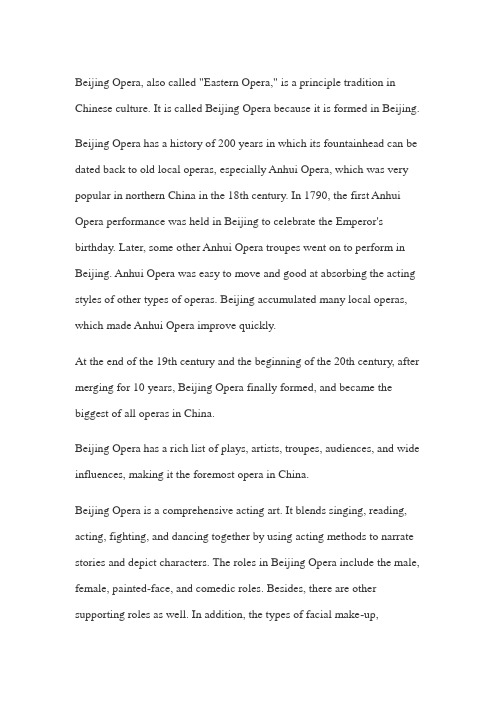
Beijing Opera, also called "Eastern Opera," is a principle tradition in Chinese culture. It is called Beijing Opera because it is formed in Beijing. Beijing Opera has a history of 200 years in which its fountainhead can be dated back to old local operas, especially Anhui Opera, which was very popular in northern China in the 18th century. In 1790, the first Anhui Opera performance was held in Beijing to celebrate the Emperor's birthday. Later, some other Anhui Opera troupes went on to perform in Beijing. Anhui Opera was easy to move and good at absorbing the acting styles of other types of operas. Beijing accumulated many local operas, which made Anhui Opera improve quickly.At the end of the 19th century and the beginning of the 20th century, after merging for 10 years, Beijing Opera finally formed, and became the biggest of all operas in China.Beijing Opera has a rich list of plays, artists, troupes, audiences, and wide influences, making it the foremost opera in China.Beijing Opera is a comprehensive acting art. It blends singing, reading, acting, fighting, and dancing together by using acting methods to narrate stories and depict characters. The roles in Beijing Opera include the male, female, painted-face, and comedic roles. Besides, there are other supporting roles as well. In addition, the types of facial make-up,especially concerning the color, are the most particular art in Beijing Opera, because they can symbolize the personalities, characteristics, and fates of the roles.It is widely acknowledged that the end of the 18th century was the most flourishing period in the development of Beijing Opera. During this time, there were lots of performances not only in folk places, but also in the palace. The noble class loved Beijing Opera; the superior elements in the palace played a positive role in the performances, make-up, and stage setting. The mutual influence between palace and non-government places promoted Beijing Opera's development.From the 1920's to the 1940's of last century was the second flourishing period of Beijing Opera. The symbol of this period was the emergence of lots of sects of the opera. The four most famous were "Mei" (Mei Lanfang 1884-1961), "Shang" (Shang Xiaoyun 1900-1976), "Cheng" (Cheng Yanqiu 1904-1958), and "Xun" (Xun Huisheng 1900-1968). Every sect had its groups of actors and actresses. Furthermore, they were extremely active on the stage in Beijing, Shanghai, and so on. The art of Beijing Opera was very popular at that time.Mei Lanfang was one of the most prominent Beijing Opera artists in the international world. He studied opera when he was 8, and began to perform on the stage when he was 11. In his more than 50 years ofperforming, Mei created and developed many acting phases, such as dancing, singing, make-up, and costumes, all of which helped him form his own style. In 1919, Mei led the opera troupe to Japan, which was the first time that China began to spread the art of Beijing opera overseas. In 1930, Mei Lanfang led a troupe to the United States and gained great success and significant recognition. In 1934, he was invited to visit Europe, and was given much attention by the European opera world. Later, other places in the world considered Beijing Opera as the performing sect of China.After the reform and opening-up policy, Beijing Opera had new development. Especially as the traditional quintessence of China, Beijing Opera got great support from the government. Today, the BeijingChang'an Opera House holds international competitions every year that attract many people from various countries. Beijing Opera is also the reserved program for the communication between Chinese and many foreign cultures.P eking opera of China is a national treasure with a history of 200 years. In the 55th year of the reign of Emperor Qianlong of the Qing Dynasty(1790) ,the four big Huiban opera Troupes entered the capital and combined with Kunqu opera, Yiyang opera, Hanju opera and Luantan in Beijing's thearetical circle of the time. Through a period of more than halfa century of combination and integration of various kinds of opera there evolved the present Peking opera, the biggest kind of opera in China, whose richness of repertoire, great number of artists of performance and of audiences, and profound influence are incomparable in China.Peking opera is a synthesis of stylized action, singing, dialogue and mime, acrobatic fighting and dancing to represent a story or depict different characters and their feelings of gladness, anger, sorrow, happiness, surprise, fear and sadness. In Peking opera there are four main types of roles: sheng (male) dan (young female), jing( painted face,male), and chou (clown, male or female). The characters may be loyal or treacherous, beautiful or ugly, good or bad, their images being vividly manifested. The repertoire of Peking opera is mainly engaged in fairy tales of preceding dynasties, important historical events, emperors, ministers and generals, geniuses and great beauties, from the ancient times to Yao, Shun, Yu, the Spring and Autumn Period, the Warring States Period and the dynasties of Qin, Han, Sui, Tang, Song, Yuan, Ming, Qing.The music of Peking opera is that of the "plate and cavity style".Its melody with harmonious rhythms is graceful and pleasing to the ears. The melody may be classified into two groups: "Xipi" and "erhong", guiding pattern, original pattern, slow pattern, quick pattern, desultary pattern being their chief patterns. The performance is accompanied by a tune played on wind instruments, percussion instruments and stringedinstruments, the chief musical instruments being jinghu (a two-stringed bowed instrument with a high register), yueqin( a four-stringed plucked instrument with a full-moon-shaped sound box), Sanxian( a three-stringed plucked instrument), suona horn, flute drum, big-gong, cymbals, small-gong, etc.The costumes in Peking opera are graceful, magnificent, elegant and brilliant, most of which are made in handicraft embroidery. As the traditional Chinese pattern are adopted, the costumes are of a high aesthetic value.The types of facial make-ups in Peking opera are rich and various, depicting different characters and remarkable images, therefore they are highly appreciated. Moreover there are numerous fixed editions of facial make-up.Since Mei Lanfang, the grand master of Peking opera, visited Japan in 1919, Peking opera has become more and more popular with people all over the world, and it has made an excellent contribution to cultural exchange between China and the West, to friendly association and to improvement of solidarity.Peking Opera house of Beijing has been invited to perform in U.S.A., England, France, Germany, Italy (three times), Australia, Japan( four times), Brazil, Turkey, Singapore, South korea and Hongkong (five times). The performances have made an outstanding contribution to Sino-foreigncultural exchange and to the promotion of friendly association of peoples in the world, and were highly appreciated by foreign audiences.In 1993 Peking Opera House of Beijing as a big Peking opera troupe made a performance visit to Taiwan, pushing the cultural exchange to a new height.Peking Opera house of Beijing is willing to participate in activities of international cultural exchange and of commercial performances and sincerely hopes that friends in various countries will make contacts with us about cultural exchange and performances.Peking opera or Beijing opera(simplified Chinese: 京剧; traditional Chinese: 京劇; pinyin: Jīngjù) is a form of traditional Chinese theatre which combines music, vocal performance, mime, dance, and acrobatics. It arose in the late 18th century and became fully developed and recognized by the mid-19th century.[1] The form was extremely popular in the Qing Dynasty court and has come to be regarded as one of the cultural treasures of China.[2] Major performance troupes are based in Beijing and Tianjin in the north, and Shanghai in the south.[3]The art form is also preserved in Taiwan, where it is known as Guoju (國劇; pinyin: Guójù). It has also spread to other countries such as the United States and Japan.[4] Peking opera features four main types of performers. Performing troupes often have several of each variety, as well as numerous secondary andtertiary performers. With their elaborate and colorful costumes, performers are the only focal points on Peking opera's characteristically sparse stage. They utilize the skills of speech, song, dance, and combat in movements that are symbolic and suggestive, rather than realistic. Above all else, the skill of performers is evaluated according to the beauty of their movements. Performers also adhere to a variety of stylistic conventions that help audiences navigate the plot of the production.[5] The layers of meaning within each movement must be expressed in time with music. The music of Peking opera can be divided into the Xipi (西皮) and Erhuang (二黄) styles. Melodies include arias, fixed-tune melodies, and percussion patterns.[6] The repertoire of Peking opera includes over 1,400 works, which are based on Chinese history, folklore, and, increasingly, contemporary life.[7]Peking opera was denounced as 'feudalistic' and 'bourgeois' during the Cultural Revolution, and replaced with the eight revolutionary model operas as a means of propaganda and indoctrination.[8] After the Cultural Revolution, these transformations were largely undone. In recent years, Peking opera has attempted numerous reforms in response to sagging audience numbers. These reforms, which include improving performance quality, adapting new performance elements, and performing new and original plays, have met with mixed success.。
鲁教版六年级英语单词

六年级英语上册Unit 1 第一单元单词good adj.好的;令人满意的morning n.早晨;上午Good morning! 早上好!hi (表示问候)嗨hello (表示问候) 喂A,a 英语字母表的第一个字母B,b 英语字母表的第二个字母C,c 英语字母表的第三个字母D,d 英语字母表的第四个字母E,e 英语字母表的第五个字母F,f 英语字母表的第六个字母G,g 英语字母表的第七个字母H,h 英语字母表的第八个字母HB (H=hard,B=black)(铅笔芯) 硬黑CD (=compact disc)光盘BBC (=British Broadcasting Corporati on)英国广播公司afternoon n.下午Good afternoon 下午好evening n.晚上;黄昏Good evening 晚上好how adv.怎样;怎么;如何are v.是you pron. 你;你们How are you? 你(身体)好吗?I pron.我am v.是I'm (=I am)我是fine adj.好的thanks n.谢谢OK adj. & adv.好;不错name n.名字list n.名单;列表Alice 艾丽斯(女名)Bob 鲍勃(男名)Cindy 辛蒂(女名)Dale 戴尔(男名)Eric 埃里克(男名)Frank 弗兰克(男名)Grace 格雷斯(女名)Helen 海伦(女名)Unit 2 第二单元单词what 什么,什么样的人(或事物)is 是what's (= what is)是什么this pron. && adj.这,这个in prep.(表示表达方式,手段等)用,以English n.英语it pron.它it's (= it is)它是a art.一个(只,把...)an art.(元音前)一个(只,把....)map n.地图orange n.橘子;橙子jacket n.夹克衫key n.钥匙quilt n.被子pen n.钢笔ruler n.直尺I,i 英语字母表的第九个字母J,j 英语字母表的第十个字母K,k 英语字母表的第十一个字母L,l 英语字母表的第十二个字母M,m 英语字母表的第十三个字母N,n 英语字母表的第十四个字母O,o 英语字母表的第十五个字母P,p 英语字母表的第十六个字母Q,q 英语字母表的第十七个字母R,r 英语字母表的第十八个字母p (=parking)abbr. (路标所示)停车(区) NBA (=National Basketball Associatio n)abbr.(美国)全国篮球协会kg (=kilogram) abbr.千克spell v.拼写;拼字please adv.(祈使句中用作请求的客套话)请Unit 3 第三单元单词color n.色;颜色red adj.&&n.红(色)的yellow adj.&&n.黄(色)的green adj.&&n.绿(色)的blue adj.&&n.蓝(色)的black adj.&&n.黑(色)的white adj.&&n.白(色)的and conj.和;又;而且S,s 英语字母表的第十九个字母T,t 英语字母表的第二十个字母U,u 英语字母表的第二十一个字母V,v 英语字母表的第二十二个字母W,w 英语字母表的第二十三个字母X,x 英语字母表的第二十四个字母Y,y 英语字母表的第二十五个字母Z,z 英语字母表的第二十六个字母S (=small) abbr.(尤指衣物的尺寸)小号M (=medium) abbr. (尤指衣物的尺寸)中号L (=large) abbr. (尤指衣物的尺寸)大号UFO (=unidentified flying object) abb r.不明飞行物CCTV (=China Central Television) ab br.中国中央电视台UN (=United Nations) abbr.联合国the art.表示特指的人、物或群体Unit 4 第四单元my prop. 我的name's = name is 名字叫clock n.时钟nice adj.好的;令人愉快的to part.用于与动词原形一起构成动词不定式meet v.遇见;相逢your pron.你的;你们的his prom.他的her pron.她的question n.问题;难题answer n.回答;答复;答案look v.看;望;看起来first adj.第一的first name 名字last adj.最后的;上一个的last name 姓氏boy n.男孩girl n.女孩zero num.&& n.零one num.一two num.二three num.三four num.四five num.五six num.六seven num.七eight num.八nine num.九telephone n.电话number n.数;数字telephone number 电话号码phone n.电话;电话机phone number 电话号码card n.卡;卡片;纸牌ID card (ID = identification) 身份证family n.家;家庭family name 姓氏Jenny 詹妮(女名)Gina 吉娜(女名)Alan 艾伦(男名)Mary 玛丽(女名)Jim 吉姆(男名)Tony 托尼(男名)Tom 汤姆(男名)Mike 迈克(男名)Green 格林(姓)Miller 米勒(姓)Jack 杰克(男名)Smith 史密斯(姓)Brown 布朗(姓)Linda 琳达(女名)Nick 尼克(男名)Kim 金(女名)Hand 汉德(姓)Unit 5 第五单元单词pencil n.铅笔book n.书eraser n.橡皮case n.箱;盒;橱pencil case 钢笔盒;文具盒backpack n.双肩背包pencil sharpener 卷笔刀;铅笔刀dictionary n.字典;词曲that pron.&& adj.那;那个yes adv.(表示肯定)是no adv.(表示否定)不;不是not adv.(构成否定形式)不是isn't = is not 不是excuse v.原谅;宽恕excuse me 请原谅(客套话,用于与陌生人搭话、打断别人说话等场合)thank v.谢谢OK interj.好;不错do v.&& aux. 做,干;构成否定句、疑问句的助动词baseball n.棒球watch n.手表computer n.电脑;电子计算机game n.游戏computer game 电子游戏notebook n.笔记本ring n.环;戒指call v.打电话at prep.在…(里面或附近);在...(点、刻);以in prep.在...里面lost v. 遗失found v.找回lost and found 失物招领school n.学校a set of 一套;一副of prep.(属于)……的Tim 蒂姆(男名)Sonia 索尼娅(女名)Jane 简(女名)Kelsey 凯思(女名)David 大卫(男名)Unit 6 第六单元单词sister n.姐;妹mother n.妈妈;母亲father n.爸爸;父亲parent n.父亲或母亲brother n.兄;弟grandmother n.祖母;外祖母grandfather n.祖父;外祖父friend n.朋友grandparent n.祖父(母);外祖父(母)those pron. && adj.那些that's (= that is)那是these pron. && adj.这些she pron.她he pron.他he's (=he is)他是aunt n. 姨母;姑母;伯母;婶母;舅母son n.儿子cousin n.堂(表)兄弟;堂(表)姐妹daughter n.女儿uncle n.叔;伯;舅;姨父;姑父picture n.照片;图画dear adj.(冠于信函中的称谓,以示礽礼貌)亲爱的for prep.(表示目的或原因)为了thanks for 为...而感谢photo n.照片;相片here adv. 这里;在这里Dave 戴维(男名)Anna 安娜(女名)Paul 保罗(男名)Emma 埃玛(女名)Mona 莫娜(女名)Unit 7 第七单元where adv.(疑问副词)在哪里where's (= where is)在哪里?table n.桌子bed n.床dresser 梳妆台bookcase 书橱;书柜sofa 沙发chair n. 椅子drawer 抽屉plant n.植物under prep.在...之下they 他们;它们;她们they're = they areon prep.在...之上don't = do notknow v.知道;了解bag n.书包;提包;口袋math n.数学alarm clock 闹钟video adj.录象带;视频tape n.录音带video tape 录像带hat n.帽子take v.拿走;带到thing n.东西;物to prep.朝;向;至;达mom 妈妈can modal v.能;可以;会bring v.拿来;取来;带来some adj.&& pron.一些;若干need v.需要floor n.地板;地面room n.房间TV (=television)电视机desk n.书桌;课桌Tommy 汤米(男名)Sally 萨莉(女名)Unit 8 第8单元have v.有soccer n.英式足球ball n.球soccer ball 英式足球tennis n.网球racket n.(网球、羽毛球的)球拍tennis racket 网球拍ping-pong n.乒乓球volleyball n.排球basketball n.篮球bat n.(乒乓球等的)球拍does v. && aux.(动词do的第三人称单数形式)做;干;构成否定名、疑问句的助动词doesn't = does notlet v.允许;让us pron.我们(宾语)let's = let usplay v.玩;打(球)well interj.喔;噢;唔;这个(用来引出一句话,继续讲述或填补间歇)sound v.听起来sport n.运动we pron.我们many adj.大量的club n.社团;俱乐部more pron.更多的;更大的class n. 班级;(一节)课interesting adj.有趣的;令人感兴趣的boring adj.无聊的;令人生厌的fun adj.有趣的;令人愉快的difficult adj.困难的relaxing adj.轻松的watch v.观看;注视watch TV 看电视has v.(have的第三人称单数形式)有great adj.美妙的;大的collection n.收藏品;收集物but conj.但是play sports 参加体育运动或比赛only adv.只;仅仅them pron.(they的宾格)他(她,它)们every adj. 每一;每个day n.天;日间;白天Peter 彼得(男名Barry 巴里(男名)Ed 埃得(男名)Hall 霍尔(姓)Unit 9 第九单元单词like v.喜欢banana n.香蕉hamburger n.汉堡包tomato n.西红柿broccoli n.花椰菜French fries 炸马铃薯条;薯条ice n.冰cream n.奶油;乳脂ice cream n.冰淇淋salad n.沙拉strawberry n.草莓pear n.梨have v.吃;饮oh interj. 啊;噢;呀(表示惊呀等)countable noun 可数名词uncountable noun 不可数名词food n.食物egg n.鸡蛋apple n.苹果carrot n.胡萝卜chicken n.鸡;鸡肉breakfast n.早餐lunch n.午餐dinner n.晚餐;正餐fruit n.水果vegetable n.蔬菜;植物runner n.奔跑者eat v.吃well adv.好、对、满意地run v.跑;奔跑star n.星星;明星lot adv. 许多lots of 大量;许多healthy a.健康的;强健的dessert n.(饭后的)甜食Bill 比尔(男名)Sandra 桑德拉(女名)Clark 克拉克(姓)Unit 10第十单元单词how much (价钱)多少pants n.裤子sock n. 短袜shirt n. 男衬衣;衬衫T-shirt n. T恤衫shorts n.(pl.)短裤sweater n.毛衣shoe n. 鞋skirt n. 裙子sale n.出售;廉价销售dollar n. 元(美国、加拿大货等车的货币单元,符号为$)big a. 广大的;重大的small a. 小的;小号的short a. 短的;矮的long a. 长的clerk n.(银行、办公室、商店等的)职员;办事员help v. 帮助;援助want v. 需要;想要Here you are. 给你。
高中英语 Unit5 lesson18 Beijing Opera课件2 北师大版必修2
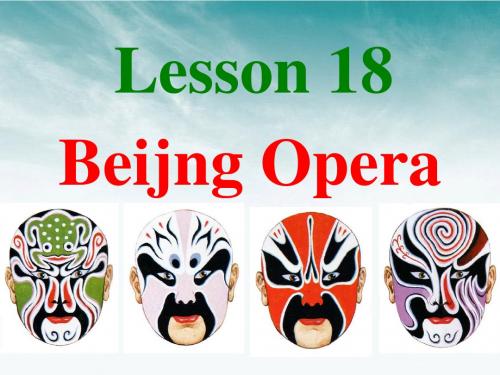
Zhu Meiling
Listen again and complete the
Function File with these words: would, can’t , let , could , OK ,know ,excuse me ,must, everyone’s going ,can
combine
the clothes worn in plays or films something with special value
movements of one’s body in a skilful way something that covers one’s face
treasure mask
Байду номын сангаас
What do the students Li Ming and Zhu Meiling get permission for? What do they not get permission for ?
Permission to go to Pufang’s birthday party No permission to go to the cinema Li Ming Permission to hand in her project next week No permission to write the project in Chinese
Lesson 18 Beijng Opera
sheng
sheng
dan
dan
jing
chou
sanxian
vilion
drum
jinghu
piano
guitar
combine
拓展 unit 6 Beijing Opera分析
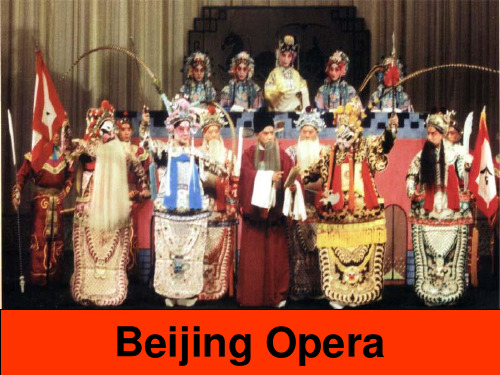
2 What can you think of when talking about Beijing Opera?
cosars 头饰
sheng生
dan旦
jing净
chou丑
mask(面具)/painted-faces
3Can you tell me some famous actors in Beijing Opera?
Fast-reading
Read Para.8,9&10
Symbolism 1 _________ is very important in Beijing Opera.
2 Can you tell me some famous permormers or actors?
Tan xinpei, Yang xiaolou , Zhou xinfang, Mei lanfang and Shang xiaoyun.
Disasters , love stories and life in the royal palace.
Fast-reading
Read Para.4,5,6&7 How many types of roles in Beijing Opera?What are they ?
beijing opera
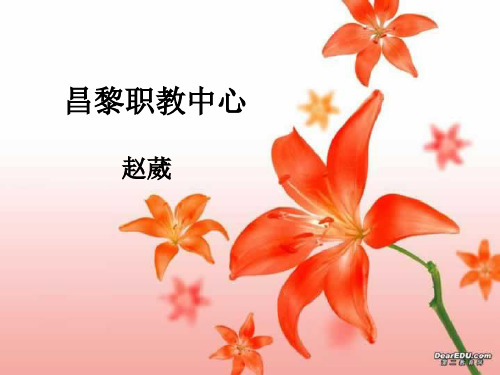
Sheng male roles with the painted face Dan Jing clown roles male roles
Chou
female
sheng
Sheng are the leading male actors who portray scholars, officials, warriors,etc. sheng can be divided into three categories : the old, the young and the kungfu experts.
The four opera groups from Anhui came to Beijing by order of the emperor.
acrobatics kungfu Read Part2 carefully and answer the question.
What are the characteristics of Beijing opera?
) 10. Walking in a circle around the stage means a long journey.
We can divide this passage into five parts , Match the paragraph with the meaning.
Part 1 (1– 2) Part 2 ( 3 ) Part 3 (4--6) Part 4 ( 7 ) Part 5 ( 8 )
Do you still remember some words that we have learned at last lesson?
戏剧 opera 杂技 acrobatics 哑剧 pantomime 戏服 costume 节奏 rhythm 乐器 instrument 扮演 portray 舞台教具 prop 鞭子 whip 滑稽演员 clown
河南省九年级英语全册Unit6Whenwasitinvented知识点总结归纳

河南省九年级英语全册Unit6Whenwasitinvented知识点总结归纳单选题1、Paper-making ________ by the Chinese in the Western Han Dynasty(朝代).A.is inventedB.inventedC.was invented答案:C句意:造纸术是中国人在西汉时期发明的。
本题考查被动语态。
主语是"Paper-making"造纸术,它和invent之间是被动关系,先排除B项;再结合in the Western Han Dynasty可知时态是一般过去时,其结构是was done的形式。
故选C。
2、The kite ________ in China more than 2000 years ago.A.inventsB.inventedC.is inventedD.was invented答案:D句意:风筝是中国在2000多年前发明的。
考查一般过去时的被动语态。
invent发明。
invents动词的第三人称单数形式;invented动词的过去式;is invented一般现在时的被动语态;was invented一般过去时的被动语态。
题中主语“The kite”与动词invent之间是动宾关系,此处用被动语态;结合题干中时间状语“2000 years ago”可知要用一般过去时的被动语态,其结构为was/were done。
故选D。
3、President Xi Jinping calls on Chinese people to ________ all the food each meal.A.eat upB.use upC.pick upD.cut up答案:A句意:习近平主席号召中国人每顿饭吃光所有的食物。
A. eat up吃光;B. use up用完;C. pick up捡起;D. cut up切碎。
北师大高中英语必修二Unit-5-Lesson-2-Beijing-Opera

5 Listening Strategies(p24)
No. 3 Listen and identify key words to help you answer the questions.
Procedure
Warm Up
Background Knowledge
Listening
pictures (3 min) questions (5 min)
Vocabulary (10 min) Listening (10 min) Retelling ( 12 min) Consolidation ( 5 min)
5. The singer wore a __m_a_s_k__ that was made of wood.
Five Listening Strategies
No. 1 Before listening, read the questions.
1.What skills do Beijing Opera actors need to have ? The skills are ____ _______ _____ …
2.Where was Beijing Opera performed at the beginning ? Places ____________ ,_____,________...
3.Why does it have very loud music and a sharp singing style? Because ___,____...
performed on open-air s_______ in markets, streets t_________ and outside temples.The music had to be played loudly and the performer and to sing
Unit5 Lesson2 Beijing Opera(教学设计)
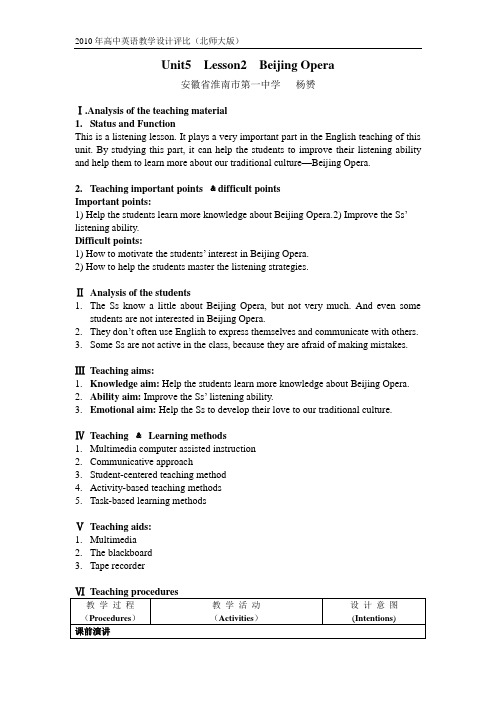
Unit5 Lesson2 Beijing Opera安徽省淮南市第一中学杨赟Ⅰ.Analysis of the teaching material1.Status and FunctionThis is a listening lesson. It plays a very important part in the English teaching of this unit. By studying this part, it can help the students to improve their listening ability and help them to learn more about our traditional culture—Beijing Opera.2.Teaching important points ﹠difficult pointsImportant points:1) Help the students learn more knowledge about Beijing Opera.2) Improve the Ss’listening ability.Difficult points:1) How to motivate the students’ interest in Beijing Opera.2) How to help the students master the listening strategies.ⅡAnalysis of the students1.The Ss know a little about Beijing Opera, but not very much. And even somestudents are not interested in Beijing Opera.2.They don’t often use English to express themselves and communicate with others.3.Some Ss are not active in the class, because they are afraid of making mistakes.ⅢTeaching aims:1.Knowledge aim: Help the students learn more knowledge about Beijing Opera.2.Ability aim: Improve the Ss’ listening ability.3.Emotional aim: Help the Ss to develop their love to our traditional culture.ⅣTeaching ﹠Learning methods1.Multimedia computer assisted instructionmunicative approach3.Student-centered teaching method4.Activity-based teaching methods5.Task-based learning methodsⅤTeaching aids:1.Multimedia2.The blackboard3.Tape recorderⅦ Blackboard designUnit5 Lesson2 Beijing OperaHistory Main rolesMain instrumentsBeijing Opera SymbolsSkillsSinging styles Costumes。
人教版新起点小学英语(词汇)1-6年级
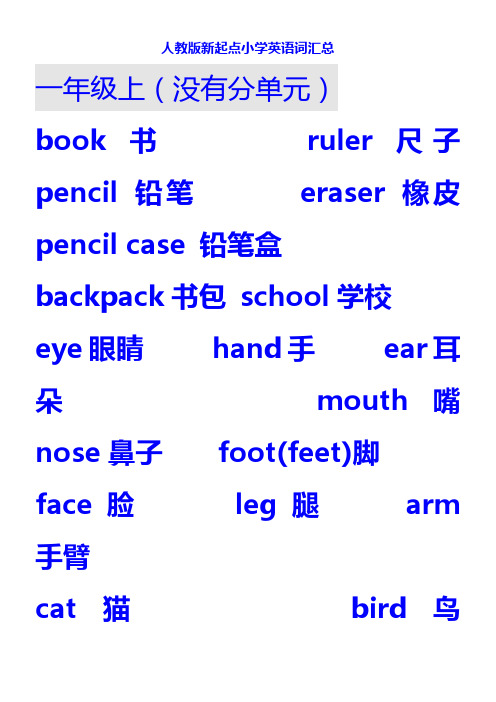
人教版新起点小学英语词汇总一年级上(没有分单元)book书ruler尺子pencil铅笔eraser橡皮pencil case 铅笔盒backpack书包school学校eye眼睛hand手ear耳朵mouth嘴nose鼻子foot(feet)脚face脸leg腿arm 手臂cat猫bird鸟rabbit兔dog狗chicken鸡duck鸭monkey猴子tiger虎panda熊猫elephant 大象fish鱼one一two二three 三four四five五six六seven七eight八nine 九ten十red红色(的) yellow黄色(的) purple紫色(的)brown棕色(的) orange橙色(的)white白色(的) green绿色(的) pink粉红色(的) blue蓝色(的) black黑色(的)apple苹果banana香蕉peach桃melon瓜pear梨orange橙子grape葡萄strawberry 草莓pineapple菠萝一年级下Unit9classroom 教室door门window窗户blackboard黑板wall 墙desk 桌子chair 椅子boy 男孩girl 女孩in 里面on 上面under下面where哪里unit 10room房间closet衣柜telephone电话computer 电脑TV 电视bed 床picture图片table餐桌lamp台灯armchair 沙发behind后面next to旁边Unit 11Toys玩具plane飞机boat船train火车ball球teddy bear玩具熊bus公交车Car小汽车doll玩具娃娃pinwheel风车box盒子Unit 13Shapes图形circle圆形triangle三角形rectangle长方形square 正方形eleven 11 twelve12 Thirteen13 fourteen14 fifteen15sixteen16 seventeen17 eighteen18 nineteen19 twenty20Unit 14Clothes衣服T-shirt T恤衫pants 裤子shorts 短裤jacket 夹克Sweater毛衣skirt短裙dress连衣裙shoe鞋子sock袜子Unit 15Food食物drink 饮料rice 米饭noodles面条jiaozi 饺子tofu豆腐Vegetables蔬菜meat牛肉fish 鱼肉chicken鸡肉bread 面包milk牛奶ice cream冰激凌juice果汁egg鸡蛋salad布丁hamburger 汉堡包cake蛋糕二年级上Unit 1family 家庭grandpa 爷爷(口)grandma 奶奶(口)dad 爸爸(口)mom 妈妈(口)sister 姐妹brother 兄弟me 我(宾格)policeman 警察doctor医生teacher 老师engineer 工程师Unit 2classmate 同学friend 朋友big 大的thin 瘦的pretty 漂亮的ugly 丑的tall 高的short 矮的from 从……来China 中国Canada 加拿大Britain 英国Unit 3park 公园hill 小山lake 湖bridge 桥tree 树grass 草flower 花bee 蜜蜂butterfly 蝴蝶*bench 长凳*picture 图画;照片*beautiful 美丽的Unit 4aunt 姑姑uncle 叔叔Unit 5street 街道van 客货车taxi 出租车bicycle 自行车subway 地铁subway station 地铁站traffic light 交通灯bus stop 公共汽车站supermarket 超级市场book store 书店school 学校hospital 医院zoo 动物园stop 停下来wait 等候go 走Unit 6Beijjig 北京Tiananmen Square 天安门广场the Great Wall 长城the Summer Palace 颐和园the Forbidden City 紫禁城Temple of Heaven 天坛Beihai Park 北海公园Beijing Zoo 北京动物园*Beijing Duck 北京烤鸭*Beijing Opera 京剧*Temple Fair 庙会*great 伟大的的;大的Unit 7Festival 节日merry 愉快的Christmas 圣诞节Christmas tree 圣诞树Santa Claus 圣诞老人bell 铃present 礼物card 明信片stocking 长袜happy 快乐的Spring Festival 春节dragon dance 舞龙paper-cut 剪纸lantern 灯笼*Hong Kong 香港*Toronto 多伦多*Sydney 悉尼*rat 鼠*ox 牛*dragon 龙*snake 蛇*horse 马*sheep 羊*rooster 鸡*pig 猪*New Year 新年小学二年级下Unit 9Season 季节spring 春季summer 夏季fall 秋季winter 冬季*bright 明亮的*golden 金色的plant 种植swim 游泳climb 攀登;爬make 制造snowman 雪人fly 放(风筝)kite 风筝*sleep 睡觉Unit 10weather 天气sunny 晴朗的cloudy 多云的rainy 下雨的windy 有风的snowy 有雪的clod 冷的cool 凉爽的warm 温暖的hot 热的Xi’an 西安Harbin 哈尔滨Shenzhen 深圳Shanghai 上海day 天scarf 围巾sunglasses 太阳镜(复数)coat 外套;大衣like 像;如何(指天气)today 今天raincoat 雨衣umbrella 雨伞Unit 11PE 体育(课)class 课can 能throw 投;掷jump 跳跃catch 接住(运动的物体)walk 走run 跑kick 踢bounce 拍(球)very well 非常好play 玩(球)pingpong 乒乓球rope 绳football 足球can’t=can not 不能*swing 秋千*jungle gym 攀登架*seesaw 跷跷板*slide 滑梯*line up 整队*at sase 稍息*attention 立正*count off 报数*turn left 向左转turn right 向右转Unit 13time 时间o’clock 中点It’s time for… 到…的时间了breakfast 早餐lunch 午餐supper 晚餐minute 分钟plus 加上half 一半hour 小时thirty 三十forty 四十fifity 五十sixty 六十*second 秒Unit 14get up 起床wash 洗brush 刷teeth 牙齿(复数)watch 看go to bed 上床睡觉when 什么时候every day 每天at 在……(指时间的某一点)Unit 15Week 星期Monday(Mon) 星期一Tuesday(Tue) 星期二Wednesday(Wed) 星期三Thursday(Thur) 星期四Friday(Fri) 星期五Saturday(Sat) 星期六Sunday(Sun) 星期日weekday (除星期六、日以外的)任何一天weekend 周末don’t=do not want 想(做某事)*Chinese 中文*music 音乐*math 数学*art 美术on 在……(指时间)Unit 16*am 上午*pm 下午*year 年*month 月小学三年级上Unit 1Myself 我自己new 新的;新来的name 名字class 班;班级Ms 女士Mr 先生old (指年龄)……岁的school 学校phone 电话number 号码primary school 小学Unit 2body 身体head 头hair 头发finger 手指neck 脖子feet脚(复数)monster 妖怪hurt 受伤toe 脚趾mater 事情bad 不好的feel感觉Unit 3food 食物fridge 冰箱beef 牛肉mantou 馒头bread 面包sausage 香肠meatball 肉丸子pancake 煎饼sandwich 三明治tomato 西红柿potato 土豆carrot 胡萝卜some 一些Unit 5pet 宠物turtle 乌龟parrot 鹦鹉dog 狗cat 猫goldfish 金鱼monkey 猴子rabbit 兔子chicken 小鸡tail 尾巴smart 聪明的cute 漂亮的catch a mouse(猫)捉老鼠wag its tail (狗)摇尾巴Unit 6clothes 服装cap 帽子scarf 围巾vest 背心gloves 手套(复数)jeans 牛仔裤sneakers 运动鞋(复数)wear 穿Unit 7birthday 生日January 一月February 二月March 三月April 四月May 五月June 六月July 七月August 八月September 九月October 十月November 十一月December十二月小学三年级下Unit9library图书馆computer room计算机教室washroom 洗手间clinic 诊所office办公室music room音乐教室first第一second第二third 第三floor楼层gym体育馆、健身房art room科学教室science room 美术教室between 在…之间Unit10Chinese中国English 英国math数学PE体育hard 难的easy容易的fun有趣的boring无趣的;单调的;乏味的interesting 有趣的Monday星期一Tuesday星期二Wednesday 星期三Thursday星期四Friday星期五favourite喜爱的why为什么Unit11after school放学后activity活动club time课外活动时间play the drum敲鼓sing songs唱歌draw pictures画画play chess下棋do art projects做手工Saturday星期六Sunday星期日play soccer踢足球dance跳舞be going to 计划…Unit13living room客厅diningroom餐厅kitchen厨房bedroom卧室study学习bathroom洗手间;浴室balcony阳台garage车库armchair扶手椅telephone电话own自己的desk 书桌teddy bear (软毛)玩具熊closet壁橱Unit14family家,家庭people人;人grandfather祖父grandmother母uncle叔叔舅舅aunt婶母;姑母;舅母father父mother母亲brother 兄;sister姐;妹cousin堂(表)兄(弟);堂(表)姐(妹) cook厨师Unit15waiter(饭店、旅馆、餐厅等的)服务员dentist牙医nurse 护士manager经理taxi-driver出租车司机policeman警察feed thefish喂鱼wash clothes 洗衣服watering the flowers浇花cook the chicken烹饪鸡clean the kitchen打扫厨房talk on the phone打电话watch TV看电视listen to music 听音乐walk the dog溜狗grandparents祖父母四年级上Unit1invitation邀请卡glue胶水crayon蜡笔scissors剪刀pen铅笔paper纸party聚会get ready准备好draw画cut剪,切stick粘贴write写,写字first首先,第一next其次then然后,于是finally最后with用… practice练习Unit2sport运动game比赛,竞赛jogging慢跑hiking徒步旅行tennis网球.网球运动cycling自行车赛.骑自行车兜风hockey曲棍球baseball棒球,棒球运动also也,同样sometimes有时,不时often常常,经常Unit3go to the movies去看电影concert音乐会,演奏会puzzle智力玩具,拼图玩具Lego乐高拼装玩具drive 开车,驾车bumper car碰碰车cool棒极了,酷的exciting激动人心的just 只是,不过so-so平常的,不好不坏的weekend周末Unit5play with fire玩火downstairs往楼下,在楼下touch触摸,碰climb爬,攀登careful小心的,仔细的dangerous危险的sidewalk人行道underpass地下通道footbridge人行桥crosswalk人行横道fence护栏traffic light 红绿灯use使用safe安全的cross穿越,横跨stop停止climb over翻越rule规则,惯例unit6pass传递,递给help帮助dictionary字典math problem数学难题CD player激光唱机eraser橡皮ruler尺子Unit7cook厨师mailman邮递员.邮差salesclerk店员,售货员hairdresser理发师,美容师dentist牙科医生computer programmer计算机程序编制员singer歌手post office邮局hospital医院store商店hotel旅馆beauty shop美容院四年级下Unit9community社区building建筑bank银行grocery store杂货drugstore药店bookstore书店police station警察局gas station加油站coffee shop 咖啡店across from在…的对面next to在紧接着的一侧between在…中间cinema 电影院newspaper 报摊bakery面包房park公园hairdresser’s美发店restaurant饭馆zoo动物园go straight往前走turn right 向右转turn left向左转crossing十字路口forward 向前Unit10city城市museum博物馆gallery美术馆university大学stadium体育馆subway station地铁站department store百货商场square广场street街道see dinosaurs参观恐龙(化石watch a soccer match看足球比赛buy a skateboard买滑板see an art show参观艺术展fly a kite放风筝visit the library参观图书馆Unit11France法国Japan日本Canada加拿大United States美国Australia澳大利亚China中国United Kingdom英国Toronto 多伦多CN Tower多伦多电视塔Paris巴黎Eiffel Tower埃菲尔铁塔Tokyo东京Cherry blossom樱花Los Angeles洛杉矶Disneyland迪斯尼乐园London伦敦Big Ben大本钟Sydney悉尼Opera house歌剧院Unit13Travel plans旅游计划beach海滩swim游泳Mount Tai泰山see the sunrise看日出Shaolin Temple少林寺learn Wushu学武术West Lake西湖take pictures safari park野生动物园see animals观看野生动物vacation假期train火车see a flower show观看花展Thailand泰国plane飞机see elephants观看大象Tibet西藏car小汽车see the Buddha Palace参观布达拉宫ship轮船bus公共汽车Unit14hobby(业余)爱好read stories 阅读故事play computer games玩电脑游戏paint picture画画collect dolls收集洋娃娃keep a diary记日记collect stamps集邮collect stickers 收集贴画make models制作模型sew(用针线)缝knit编织;针织collect coins收集硬币playchess下象棋travel旅行hike远足;徒步;旅行Unitcommunication交流;联络write a letter写信send an e-mail发送电子邮件mail a postcard寄明信片mailbox邮筒make a phone call打电话pay phone (投币式)公用电话send a short massage (用手机)发短信cell phone手机五年级上Unit1his他的her她的their他(她,它)们的twins孪生子,双胞胎blond金黄色的curly卷曲的slim苗条的straight直的freckles雀斑talkative健谈的,多嘴的honest诚实的careless粗心的popular受欢迎的hardworking 刻苦的shy害羞的lazy懒惰的quiet文静的helpful乐于助人的friendly友善的funny有趣的,滑稽可笑的Unit 2than比,比较short短的,矮的old年长的,旧的long长的small小的better (Good和well的比较级)更好的(地) fast快的,快地hard刻苦地,努力地Unit 3pretty漂亮的ugly丑陋的thick厚的thin薄的,瘦的best (Good和well的最高级)最好的(地)Unit5notebook笔记本stapler订书器glue stick胶棒disk 磁盘whiteout涂改液backpack背包pencil case 文具盒brush毛笔folder 文件夹sticker不干胶贴片expensive昂贵的cheap便宜的 a pair of一双(把,幅,条)..running shoes跑鞋,运动鞋size尺寸 a good deal 公平交易these这些try…on试穿…them他们,她们,它们fit适合Unit 6oil油bowl碗plate盘子wok锅wash洗crack敲碎mix混合put放,摆add加salt盐serve将(饭菜)摆上桌stir-fry (用旺火)快炒stir-fry vegetables用旺火炒的菜cucumber黄瓜soy sauce酱油sauce酱,调味品vinegar醋sugar糖pepper 胡椒(粉)Unit 7children儿童show节目report报告entertainment 娱乐节目nature自然Peking opera京剧movie电影commercial(电视或无线电中的)广告kind of种(类)think of想,认为channel频schedule时间表,一览表Carto City (节目名称)动画城Magic Earth (节目名称)神奇地球quiz答问比赛,智力测验Animal World (节目名称)动物世界comedy喜剧Artist’s Life (节目名称)艺术人生video电视,录像action动作片五年级下。
八年级英语上册Unit6I'mgoingtostudycomputerscience综合水平测试(新
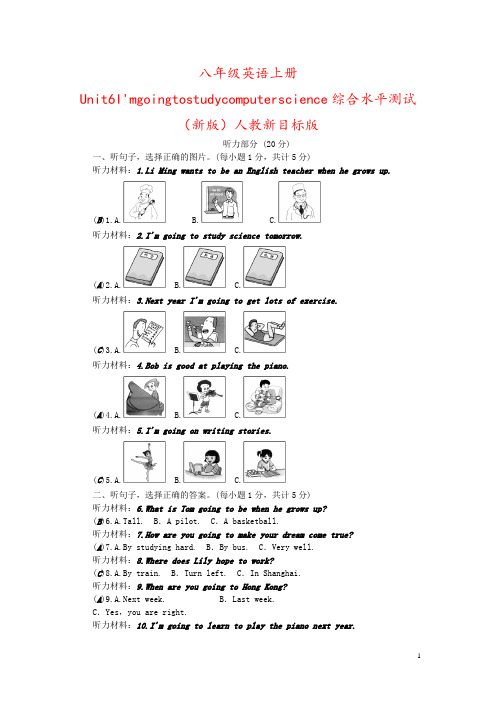
八年级英语上册Unit6I'mgoingtostudycomputerscience综合水平测试(新版)人教新目标版听力部分 (20分)一、听句子,选择正确的图片。
(每小题1分,共计5分)听力材料:1.Li Ming wants to be an English teacher when he grows up.(B)1.A. B. C.听力材料:2.I'm going to study science tomorrow.(A)2.A. B. C.听力材料:3.Next year I'm going to get lots of exercise.(C)3.A. B. C.听力材料:4.Bob is good at playing the piano.(A)4.A. B. C.听力材料:5.I'm going on writing stories.(C)5.A. B. C.二、听句子,选择正确的答案。
(每小题1分,共计5分)听力材料:6.What is Tom going to be when he grows up?(B)6.A.Tall. B.A pilot. C.A basketball.听力材料:7.How are you going to make your dream come true?(A)7.A.By studying hard. B.By bus. C.Very well.听力材料:8.Where does Lily hope to work?(C)8.A.By train. B.Turn left. C.In Shanghai.听力材料:9.When are you going to Hong Kong?(A)9.A.Next week. B.Last week.C.Yes,you are right.听力材料:10.I'm going to learn to play the piano next year.(B)10.A.Of course. B.Great. C.Have a good time.三、听对话,选择正确的答案。
人教版小学英语词汇1-6年级
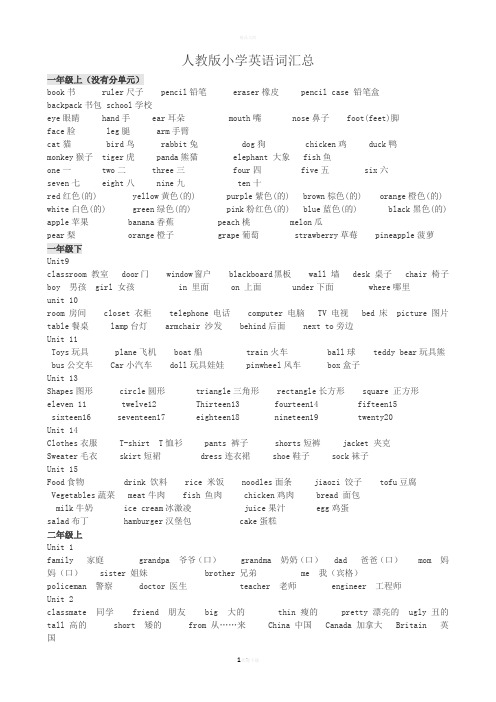
人教版小学英语词汇总一年级上(没有分单元)book书 ruler尺子 pencil铅笔 eraser橡皮 pencil case 铅笔盒backpack书包 school学校eye眼睛 hand手 ear耳朵 mouth嘴 nose鼻子 foot(feet)脚face脸 leg腿 arm手臂cat猫 bird鸟 rabbit兔 dog狗 chicken鸡 duck鸭monkey猴子 tiger虎 panda熊猫 elephant 大象 fish鱼one一 two二 three三 four四 five五 six六seven七 eight八 nine九 ten十red红色(的) yellow黄色(的) purple紫色(的) brown棕色(的) orange橙色(的) white白色(的) green绿色(的) pink粉红色(的) blue蓝色(的) black黑色(的) apple苹果 banana香蕉 peach桃 melon瓜pear梨 orange橙子 grape葡萄 strawberry草莓 pineapple菠萝一年级下Unit9classroom 教室 door门 window窗户 blackboard黑板 wall 墙 desk 桌子 chair 椅子boy 男孩 girl 女孩 in 里面 on 上面 under下面 where哪里unit 10room房间 closet衣柜 telephone电话 computer 电脑 TV 电视 bed 床 picture图片table餐桌 lamp台灯 armchair 沙发 behind后面 next to旁边Unit 11Toys玩具 plane飞机 boat船 train火车 ball球 teddy bear玩具熊bus公交车 Car小汽车 doll玩具娃娃 pinwheel风车 box盒子Unit 13Shapes图形 circle圆形 triangle三角形 rectangle长方形 square 正方形eleven 11 twelve12 Thirteen13 fourteen14 fifteen15sixteen16 seventeen17 eighteen18 nineteen19 twenty20Unit 14Clothes衣服 T-shirt T恤衫 pants 裤子 shorts短裤 jacket 夹克Sweater毛衣 skirt短裙 dress连衣裙 shoe鞋子 sock袜子Unit 15Food食物 drink 饮料 rice 米饭 noodles面条 jiaozi 饺子 tofu豆腐Vegetables蔬菜 meat牛肉 fish 鱼肉 chicken鸡肉 bread 面包milk牛奶 ice cream冰激凌 juice果汁 egg鸡蛋salad布丁 hamburger汉堡包 cake蛋糕二年级上Unit 1family 家庭 grandpa 爷爷(口) grandma 奶奶(口) dad 爸爸(口) mom 妈妈(口) sister 姐妹 brother 兄弟 me 我(宾格)policeman 警察 doctor 医生 teacher 老师 engineer 工程师Unit 2classmate 同学 friend 朋友 big 大的 thin 瘦的 pretty 漂亮的 ugly 丑的tall 高的 short 矮的 from 从……来 China 中国 Canada 加拿大 Britain 英国Unit 3park 公园 hill 小山 lake 湖 bridge 桥 tree 树 grass 草flower 花 bee 蜜蜂 butterfly 蝴蝶 *bench 长凳 *picture 图画;照片 *beautiful 美丽的Unit 4aunt 姑姑 uncle 叔叔Unit 5street 街道 van 客货车 taxi 出租车 bicycle 自行车 subway 地铁subway station 地铁站 traffic light 交通灯 bus stop 公共汽车站supermarket 超级市场 book store 书店 school 学校 hospital 医院zoo 动物园 stop 停下来 wait 等候 go 走Unit 6Beijjig 北京 Tiananmen Square 天安门广场 the Great Wall 长城the Summer Palace 颐和园 the Forbidden City 紫禁城 Temple of Heaven 天坛Beihai Park 北海公园 Beijing Zoo 北京动物园 *Beijing Duck 北京烤鸭*Beijing Opera 京剧 *Temple Fair 庙会 *great 伟大的的;大的Unit 7Festival 节日 merry 愉快的 Christmas 圣诞节 Christmas tree 圣诞树Santa Claus 圣诞老人 bell 铃 present 礼物 card 明信片stocking 长袜 happy 快乐的 Spring Festival 春节 dragon dance 舞龙paper-cut 剪纸 lantern 灯笼 *Hong Kong 香港 *Toronto 多伦多 *Sydney 悉尼*rat 鼠 *ox 牛 *dragon 龙 *snake 蛇 *horse 马*sheep 羊 *rooster 鸡 *pig 猪 *New Year 新年小学二年级下Unit 9Season 季节 spring 春季 summer 夏季 fall 秋季 winter 冬季*bright 明亮的 *golden 金色的 plant 种植 swim 游泳 climb 攀登;爬make 制造 snowman 雪人 fly 放(风筝) kite 风筝 *sleep 睡觉Unit 10weather 天气 sunny 晴朗的 cloudy 多云的 rainy 下雨的 windy 有风的snowy 有雪的 clod 冷的 cool 凉爽的 warm 温暖的 hot 热的Xi’an 西安 Harbin 哈尔滨 Shenzhen 深圳 Shanghai 上海 day 天scarf 围巾 sunglasses 太阳镜(复数) coat 外套;大衣like 像;如何(指天气) today 今天 raincoat 雨衣 umbrella 雨伞Unit 11PE 体育(课) class 课 can 能 throw 投;掷 jump 跳跃catch 接住(运动的物体) walk 走 run 跑 kick 踢bounce 拍(球) very well 非常好 play 玩(球) pingpong 乒乓球rope 绳 football 足球 can’t=can not 不能 *swing 秋千*jungle gym 攀登架 *seesaw 跷跷板 *slide 滑梯 *line up 整队*at sase 稍息 *attention 立正 *count off 报数 *turn left 向左转turn right 向右转Unit 13time 时间 o’clock 中点 It’s time for…到…的时间了 breakfast 早餐lunch 午餐 supper 晚餐 minute 分钟 plus 加上 half 一半hour 小时 thirty 三十 forty 四十 fifity 五十 sixty 六十*second 秒Unit 14get up 起床 wash 洗 brush 刷 teeth 牙齿(复数) watch 看go to bed 上床睡觉 when 什么时候 every day 每天 at 在……(指时间的某一点)Unit 15Week 星期 Monday(Mon) 星期一 Tuesday(Tue) 星期二Wednesday(Wed) 星期三 Thursday(Thur) 星期四 Friday(Fri) 星期五Saturday(Sat) 星期六 Sunday(Sun) 星期日 weekday(除星期六、日以外的)任何一天weekend 周末 don’t=do not want 想(做某事)*Chinese 中文 *music 音乐 *math 数学*art 美术 on 在……(指时间)Unit 16*am 上午 *pm 下午 *year 年 *month 月小学三年级上Unit 1Myself 我自己 new 新的;新来的 name 名字 class 班;班级Ms 女士 Mr 先生 old (指年龄)……岁的 school 学校phone 电话 number 号码 primary school 小学Unit 2body 身体 head 头 hair 头发 finger 手指 neck 脖子 feet脚(复数)monster 妖怪 hurt 受伤 toe 脚趾 mater 事情 bad 不好的 feel感觉Unit 3food 食物 fridge 冰箱 beef 牛肉 mantou 馒头 bread 面包 sausage 香肠 meatball 肉丸子 pancake 煎饼 sandwich 三明治 tomato 西红柿 potato 土豆 carrot 胡萝卜 some 一些Unit 5pet 宠物 turtle 乌龟 parrot 鹦鹉 dog 狗 cat 猫 goldfish 金鱼monkey 猴子rabbit 兔子 chicken 小鸡 tail 尾巴 smart 聪明的 cute 漂亮的catch a mouse(猫)捉老鼠 wag its tail (狗)摇尾巴Unit 6clothes 服装 cap 帽子 scarf 围巾 vest 背心 gloves 手套(复数)jeans 牛仔裤 sneakers 运动鞋(复数) wear 穿Unit 7birthday 生日 January 一月 February 二月 March 三月 April 四月May 五月 June 六月 July 七月 August 八月 September 九月October 十月 November 十一月 December十二月小学三年级下Unit9library图书馆 computer room计算机教室 washroom洗手间 clinic 诊所 office办公室music room音乐教室 first第一 second第二 third 第三 floor楼层gym体育馆、健身房 art room科学教室 science room美术教室 between 在…之间Unit10Chinese中国 English 英国 math数学 PE体育 hard难的 easy容易的fun有趣的 boring无趣的;单调的;乏味的 interesting有趣的 Monday星期一Tuesday星期二 Wednesday星期三 Thursday星期四 Friday星期五 favourite喜爱的why为什么Unit11after school放学后 activity活动 club time课外活动时间 play the drum敲鼓sing songs唱歌 draw pictures画画 play chess下棋 do art projects做手工Saturday星期六 Sunday星期日 play soccer踢足球 dance跳舞 be going to 计划…Unit13living room客厅 dining room餐厅 kitchen厨房 bedroom卧室 study学习bathroom洗手间;浴室 balcony阳台 garage车库 armchair扶手椅 telephone电话own自己的 desk 书桌 teddy bear (软毛)玩具熊 closet壁橱Unit14family家,家庭 people人;人民 grandfather祖父 grandmother祖母 uncle叔叔舅舅aunt婶母;姑母;舅母 father父亲 mother母亲 brother 兄;弟 sister姐;妹cousin堂(表)兄(弟);堂(表)姐(妹) cook厨师Unit15waiter(饭店、旅馆、餐厅等的)服务员 dentist牙医 nurse护士 manager经理taxi-driver出租车司机 policeman警察 feed the fish喂鱼wash clothes 洗衣服 watering the flowers浇花 cook the chicken烹饪鸡clean the kitchen打扫厨房 talk on the phone打电话 watch TV看电视listen to music 听音乐 walk the dog溜狗 grandparents祖父母四年级上Unit1invitation邀请卡 glue胶水 crayon蜡笔 scissors剪刀 pen铅笔paper纸 party聚会 get ready准备好 draw画 cut剪,切stick粘贴 write写,写字 first首先,第一 next其次 then然后,于是finally最后 with用… practice练习Unit2sport运动 game比赛,竞赛 jogging慢跑 hiking徒步旅行 tennis网球.网球运动cycling自行车赛.骑自行车兜风 hockey曲棍球 baseball棒球,棒球运动 also也,同样sometimes有时,不时 often常常,经常Unit3go to the movies去看电影 concert音乐会,演奏会 puzzle智力玩具,拼图玩具Lego乐高拼装玩具 drive开车,驾车 bumper car碰碰车 cool棒极了,酷的exciting激动人心的 just只是,不过 so-so平常的,不好不坏的 weekend周末Unit5play with fire玩火 downstairs往楼下,在楼下 touch触摸,碰 climb爬,攀登careful小心的,仔细的 dangerous危险的 sidewalk人行道 underpass地下通道footbridge人行桥 crosswalk人行横道 fence护栏 traffic light红绿灯use使用 safe安全的 cross穿越,横跨 stop停止climb over翻越 rule规则,惯例unit6pass传递,递给 help帮助 dictionary字典 math problem数学难题CD player激光唱机 eraser橡皮 ruler尺子Unit7cook厨师 mailman邮递员.邮差 salesclerk店员,售货员 hairdresser理发师,美容师dentist牙科医生 computer programmer计算机程序编制员 singer歌手post office邮局 hospital医院 store商店 hotel旅馆 beauty shop美容院四年级下Unit9community社区 building建筑物 bank银行 grocery store杂货店 drugstore药店bookstore书店 police station警察局 gas station加油站 coffee shop咖啡店across from在…的对面 next to在紧接着的一侧 between在…中间cinema 电影院 newspaper报摊 bakery面包房 park公园 hairdresser’s美发店restaurant饭馆 zoo动物园 go straight往前走 turn right向右转 turn left向左转crossing十字路口 forward向前Unit10city城市 museum博物馆 gallery美术馆 university大学 stadium体育馆subway station地铁站 department store百货商场 square广场 street街道see dinosaurs参观恐龙(化石) watch a soccer match看足球比赛 buy a skateboard买滑板see an art show参观艺术展 fly a kite放风筝 visit the library参观图书馆Unit11France法国 Japan日本 Canada加拿大 United States美国 Australia澳大利亚China中国 United Kingdom英国 Toronto多伦多 CN Tower多伦多电视塔Paris巴黎 Eiffel Tower埃菲尔铁塔 Tokyo东京 Cherry blossom樱花Los Angeles洛杉矶 Disneyland迪斯尼乐园 London伦敦 Big Ben大本钟Sydney悉尼 Opera house歌剧院Unit13Travel plans旅游计划 beach海滩 swim游泳 Mount Tai泰山see the sunrise看日出 Shaolin Temple少林寺 learn Wushu学武术West Lake西湖 take pictures拍照 safari park野生动物园 see wild animals观看野生动物vacation假期 train火车 see a flower show观看花展 Thailand泰国plane飞机 see elephants观看大象 Tibet西藏 car小汽车see the Buddha Palace参观布达拉宫 ship轮船 bus公共汽车Unit14hobby(业余)爱好 read stories 阅读故事 play computer games玩电脑游戏paint picture画画 collect dolls收集洋娃娃 keep a diary记日记 collect stamps集邮collect stickers 收集贴画 make models制作模型 sew(用针线)缝 knit编织;针织collect coins收集硬币 play chess下象棋 travel旅行 hike远足;徒步;旅行Unitcommunication交流;联络 write a letter写信 send an e-mail发送电子邮件mail a postcard寄明信片 mailbox邮筒 make a phone call打电话pay phone (投币式)公用电话 send a short massage (用手机)发短信 cell phone手机五年级上Unit1his他的 her她的 their他(她,它)们的 twins孪生子,双胞胎 blond金黄色的curly卷曲的 slim苗条的 straight直的 freckles雀斑 talkative健谈的,多嘴的honest诚实的 careless粗心的 popular受欢迎的 hardworking刻苦的 shy害羞的lazy懒惰的 quiet文静的 helpful乐于助人的 friendly友善的funny有趣的,滑稽可笑的Unit 2than比,比较 short短的,矮的 old年长的,旧的 long长的 small小的better (Good和well的比较级)更好的(地) fast快的,快地 hard刻苦地,努力地Unit 3pretty漂亮的 ugly丑陋的 thick厚的 thin薄的,瘦的 best (Good和well的最高级)最好的(地) Unit5notebook笔记本 stapler订书器 glue stick胶棒 disk磁盘 whiteout涂改液backpack背包 pencil case文具盒 brush毛笔 folder文件夹 sticker不干胶贴片expensive昂贵的 cheap便宜的 a pair of一双(把,幅,条).. running shoes跑鞋,运动鞋size尺寸 a good deal公平交易 these这些 try…on试穿…them他们,她们,它们 fit适合Unit 6oil油 bowl碗 plate盘子 wok锅 wash洗 crack敲碎 mix混合put放,摆 add加 salt盐 serve将(饭菜)摆上桌 stir-fry (用旺火)快炒stir-fry vegetables用旺火炒的菜 cucumber黄瓜 soy sauce酱油sauce酱,调味品 vinegar醋 sugar糖 pepper胡椒(粉)Unit 7children儿童 show节目 report报告 entertainment娱乐节目 nature自然Peking opera京剧 movie电影 commercial(电视或无线电中的)广告 kind of种(类)think of想,认为 channel频道 schedule时间表,一览表 Cartoon City (节目名称)动画城Magic Earth (节目名称)神奇地球 quiz答问比赛,智力测验Animal World (节目名称)动物世界 comedy喜剧 Artist’s Life (节目名称)艺术人生video电视,录像 action动作片五年级下Unit 9go for a picnic去野餐 go shopping买东西 play in the school band参加校乐队play the flute吹笛子 do the dishes洗碗 make a model plane制作航模learn to act学表演 kick a shuttlecock踢毽子 go to the drama club参加戏剧社once一次 twice两次 never从未 go roller--skating去滚轴溜冰play badminton打羽毛球Unit 10set the table摆放餐具 clean the living room打扫客厅 take out the garbage倒垃圾sweep the floor扫地 make the bed铺床 clear the table收拾桌子have to不得不 a lot of许多 do chores做家务 look after照看;照顾finish the art project完成手工制作 tomorrow明天 practice the piano练习弹钢琴study for a test复习准备考试 the day after tomorrow后天go ahead (对做某事的)许可Unit 11keep fit保持健康 tired疲倦的 plenty of许多;大量 sleep睡眠 before在……之前drink喝 exercise锻炼 leave garbage everywhere乱扔垃圾 too much太多pop汽水 stay up late熬夜 should应该 shouldn’t不应该 headache头痛a running nose鼻涕 sleepy困的 have a cold患了感冒 stomachache胃痛;肚子痛toothache牙痛 more更多的 candy糖果 medicine药take some medicine吃药 junk food不利健康的食品 right after刚…就rUnit 13do homework做家庭作业 visit看望;访问 last上一个的;刚过去的 stay在某外呆着row划(船) yesterday昨天 all day一整天Unit 14wonderful好极了;奇妙的 lose丢失 sleep睡觉 terrible可怕的 buy买souvenir纪念品;礼物 Inner Mongolia内蒙古 ride骑 teach教;讲授meet会见;遇见 whole完全的;全部的 far away远的;遥远的Unit 15Noisy 吵闹的 nursery school 幼儿园 rhyme押韵的诗 primary school 小学become 成为 Young Pioneer [,paiə'niə]少先队员 win 赢;获胜prize 奖;奖励 competition 竞赛;比赛六年级上Unit1province 省 east东;东方 south 南;南方 west西;西方 north北;北方the Potala Palace 布达拉宫 the Shaolin Temple 少林寺 Yellow Mountain 黄山the Stone Forest 石林 Elephant Trunk Hill 象鼻山 Tibet 西藏Mountain Tai 泰山 snow-capped mountain 雪山 the warriors 兵马俑the Mogao Caves 莫高窟 silk 丝绸 Chinese tea中国茶 Mountain Emei 峨眉山Unit 2Continent洲;大陆 Asia 亚洲 Europe 欧洲 Africa 非洲 North America 北美洲South America 南美洲 Oceania 大洋洲 Egypt 埃及 Spain 西班牙the United States 美国 Thailand 泰国 Australia 澳洲;澳大利亚Russia 俄罗斯 Chinese 汉语 French 法语 Russian 俄语Japanese 日语 pyramid 金字塔 koala 树袋熊 kangaroo 袋鼠Unit3reptile 爬行动物 mammal 哺乳动物 insect 昆虫 crocodile 鳄鱼ostrich 鸵鸟 penguin 企鹅 whale 鲸 shark 鲨 hippo 河马zebra 斑马 lion 狮子 butterfly 蝴蝶 hummingbird 蜂鸟centimeter 厘米 giraffe 长颈鹿 meter 米 kilometer千米strong 强壮的 wing 翅膀 ton 吨 heavy 重的Unit 5surprised 惊讶的 angry 生气的 happy 快乐的;高兴的 worried 忧愁的 sad伤心的excited 兴奋的 nervous 紧张的 proud 骄傲的Unit 6artist 艺术家;(尤指)画家 actor 演员 musician 音乐家 writer 作家scientist 科学家 inventor 发明家 Chinese 中国人 German德国人Danish 丹麦人 English 英格兰人 American 美国人compose写;创作(乐曲、歌剧等) national anthem 国歌 Peking opera 京剧shrimp 虾 invent 发明 light bulb 灯泡 story 故事Unit 7astronaut 宇航员 detective 侦探 professor 教授 president (学院的)院长principal(中小学校的)校长 sun 太阳 moon月亮 ocean 海洋cloud 云彩 robot 机器人 housework 家务劳动 pollution 污染pill 药片 peace和平 earth地球 spaceship宇宙飞船 Mars 火星六年级下Unit 9attend 上学;出席 software 软件 develop 发展 basic 基础的 personal 个人的 leader领导 knock 敲 quickly 快速 nut 干果;坚果 claw 爪子 lock 锁Unit 10common 普通的;一般的 moose 北美鹿;驼鹿 modern 现代的 once 从前 teeny tiny很小的,微型的Unit 11make sure 确定 litter box 垃圾箱 sick 生病的 bored枯燥的 push 推 everywhere到处poor可怜的Unit 12fantasy 幻想 reason 理由 sign 标牌 photography 摄影,照相 folder 夹子Unit 13fire 火 bloom 盛开 temperature 温度 degree 度数 during 在……期间 seed 种子 return 返回 example wake up such as disappearing cost however decideUnit 14Italian 意大利人,意大利语 Korean 韩国人,韩语 Vancouver 温哥华(加拿大城市)Ottawa 渥太华(加拿大城市) Quebec魁北克(加拿大省)Montreal 蒙特利尔(加拿大城市) turkey 火鸡 pumpkin pie 南瓜馅饼cranberry 梅果 lunar calendar 阴历 Kofi A. Ann 安南(联合国秘书长)Ghana 加纳(非洲国家名) Secretary-General 联合国秘书长 Nobel Prize 诺贝尔奖peace 和平 Marie Curie 居里夫人 radium 镭(金属元素) physics 物理chemistry 化学 graduate 毕业 Chicago 芝加哥(美国城市)Unit 15sail 航行 sailor 船员 finish 完成 alone 独自 zeppelin 齐柏林飞艇Germany 德国(国家名) beauty 美丽 magic 有魔力的 agree 同意kilometer 公里 follow 跟随 continue 继续Unit 16machine 机器 lift 举起 hold 拿住,抓住 sense 感觉到,检测到outer space 宇宙空间 volcano 火山 construct 建造 wizard 男巫,术士suddenly 忽然 hit 打击,撞击 sly 狡猾的 cave 洞穴。
Beijing Opera

Beijing OperaBeijing Opera represents the finest combination of literature, music, dance, martial arts, fine arts, acrobatics and many other arts available. Its way of performing is of as much a feature, differing from opera, pantomime and drama. The Peking Opera is a kind of art that pays equal attention to 'Chang (Singing)', 'Nian (Speaking)', 'Zuo (Acting)' and 'Da (Fighting)'. Singing in Beijing Opera has the certain tune that expresses the sentiment of the dramatic persona; Speaking in the play is the speech except singing; Acting is the performance of movement and expression; Fighting is the martial arts performed by dancing. It enables the audience to be inspired by the affection, not only from the language but also from the music, the physique and the fine arts. Simultaneously, Beijing Opera provides the opportunity to appreciate the pleasing stylistic and artistic harmony of the dance and music, the strength of the rhythm and designs even from only experiencing one act.DerivationBeijing Opera originated from the middle period of the Qing Dynasty (1644-1911). In the 55th year reigned by the Emperor Qianlong (1790), the most famous four theatrical troupes in Anhui – Sanqing Troupe, Sixi Troupe, Chungong Troupe and Chun Troupe went to Beijing in succession to show their opera performance and then obtained the unprecedented success. Then, based on 'Anhui Opera', 'Han Opera', absorbing the essence of the local folk ditty like the 'Kun Opera', 'Yiyang Opera' and 'Shaanxi Opera' and also mixed with characteristics of Beijing dialect, Beijing Opera was formed. Although formed in Beijing, it is not the native-born but a melting opera.There were many names for Beijing Opera in its history such as Pihuang, Erhuang, Huang Qiang, Peking Opera (Jingdiao or Jingxi in Chinese), Pingju Opera and Chinese Opera (Guoju in Chinese). The earliest name of the Beijing Opera was seenin the newspaper of that time – 'Declaration' in the second year of the Emperor Guangxu (1876).The Beijing Opera was officially formed after the 20th year of the Emperor Daoguang (1840). At that time, the formats of each kind of arias and the language characteristic of Beijing Opera initially came into being. New changes appeared in the Opera's role.A list of plays possessing the characteristics of the Beijing Opera and the first generation of the opera actors were also taken on.CharacteristicsSimilar to the western opera, the Beijing Opera is a combination of singing, dancing, martial arts, music and literature, so it is also called the 'Oriental Opera' by western people. In their own cultural backgrounds, they all have obtained classical status.Aria –The music for the voice of Beijing Opera belongs to the Ban-qiang (a kind of structural style in drama), including two arias of Erhuang and Xipi, so the Beijing Opera is also called 'Pihuang'. The arias commonly used in Beijing Opera also include other tunes like the Nanbangzi (an aria in Bangzi Opera), Sipingdiao (an aria in Sichuan Opera), Gaobozi (an aria in Anhui Opera) and Chuiqiang (the Anhui Opera with flute accompaniment).Theme –The Beijing Opera is always based on the political and military struggle of an historical theme; the story mostly is taken from an historical novel.Role –Beijing Opera has very strict role division. There were seven in the early time: Sheng, Dan, Jing, Mo, Chou, Wuhang and Longtao (Walking-on). Later it was converged into four: Sheng, Dan, Jing and Chou. 'Sheng' acts the masculine positive role. According to the different age, identity and character, it is also divided into three kinds: Laosheng (Old Men), Xiaosheng (Young Men) and Wusheng (Military Men). 'Dan' acts the feminine positive role and is also divided into many kinds: Qingyi (the honorable women attired in distinguished dress), Huadan (theinnocent and extroverted young ladies or the shrewish and extravagant female), Laodan (Old Ladies), Wudan (Military Women) and so on. 'Jing' acts the supporting role of great-hearted masculine, the characteristic is that their faces must be painted; Therefore Jing is also called 'Face-Painted Role'. 'Chou' acts as a lively, humorous, quick-witted masculine; sometimes they also play the reverse role which is sinister and sly. Each kind of role also has different face-painting and dressing to indicate their identity.Face-painting –The make-up that the Beijing Opera puts on the actor's face also has a special characteristic for displaying the character of the specific role. Using particular colors on the actor's face to symbolize their character and quality, role and destiny is not only the major characteristic of Beijing Opera, but also the key to understand the opera's plot. Simply speaking, the red painted-face has the commendatory meaning, representing allegiance and gallantry; The black painted-face is more neutral, representing valor and wise; The blue and the green ones are also neutrality, representing the bold and courageous hero; The yellow and the white painted-faces has the derogatory meaning, representing atrocity and duplicity; The golden and the argentite painted-faces are more mystical, representing god or a monster.Dressing – The clothing used in the Beijing Opera also represents particular characteristics and specific importance to attract the audience's attention. It took the example of every-day clothing in ancient Chinese times as the foundation, imitating the dressing-style of the Ming Dynasty and later extracting the attire characteristic and style of the Qing Dynasty and the dressing of Baqi ('Eight Banners': military organization of Manchu in Qing Dynasty). After many artists' refinement, recapitulation, beautification and decoration, the appropriative clothing of a certain pattern was then formed and the shoptalk of Beijing Opera called it 'Xingtou' (the actor's costumes). Xingtou is the general term used for clothing for all kinds of roles, including long gowns, short clothes, armor, casque hats, boots and shoes, as well as assistant clothing or things attached to dressing.Beijing Opera performances are renowned for their very vibrant and gorgeous colored costumes. It is the main part of the character modeling on the stage. The Peking Opera clothing captures the rich experience and creates the unique artistic style that is so admired and loved to be seen and heard by mass audiences.List of Plays –Beijing Opera has many plays; it is said that the number of the plays is approximately 3,800. At present, the plays being performed are mainly of three kinds: the traditional play (nearly 1,300), the newly-written historical play and the modern play.GenresSince the Peking Opera has formed, many outstanding actors have emerged. They have all contributed to Beijing Opera's innovation and development regarding the aspects of aria, performance, plays, role modeling and so on. Thus many genres with much stronger influence have been created.The most famous genre of the Beijing Opera, which is of much prevalence, is created by the Four Famous 'Dans' (Mei Lanfang, Shang Xiaoyun, Cheng Yanqiu and Xun Huisheng). While in 'Jing' of the Beijing Opera, Jin Shaoshan, Hao Shouchen and Hou Xirui respectively are the stylists that have a certain genre of their own.Mei Lanfang - one of the most remarkable performing artists in Beijing Opera, was born in Beijing with a family under a very poor circumstance in childhood. His life was bitter and he had no opportunity to go to school, so he went to the troupe when he was 8 years old to learn the Beijing Opera. Mr. Mei mounted the stage when he was 11 years old to perform the plays of the Beijing Opera. He has been an opera actor for more than 50 years, performing hundreds of traditional plays and over 30 modern plays. He portrayed many bright and lifelike female figures on the stage and became the glorious model in Chinese Beijing Opera and even within the entire artistic circle.This renowned artistic master's background was certainly not outstanding or indeed a contributory factor to his success. However he attributes his extraordinary artistic achievements modestly to the way he emulated his peers, and to his total dedication, diligent studying and hard training, and his continual spirit and desire to strive for perfection. His style of spoken parts in the Beijing Opera is unique; his performance on the stage with ordered step routines, accurate rhythm and graceful posture, was quite exquisite and exactly accorded with his role status. Moreover, his performance was often refined into the exquisite dance, which has enriched and developed the performing arts of Dan in Beijing Opera, finally forming the famous genre of Mei.In 1919, Mei Lanfang led the troupe that went to Japan to perform. This was the first time that this famous Chinese art- Beijing Opera had an overseas dissemination; in 1924, he led the troupe to perform once again in Japan; in 1930, he led the opera team which was comprised of 20 people to America to give a visiting performance and obtained enormous success; in 1934, he went to Europe to visit by invitation and performed in the Soviet Union, receiving the recognition of the European theatrical circle. Thereafter, the whole world regarded Beijing Opera as the school of Chinese histrionics.Beijing Opera, known as the essence of Chinese national drama, has tremendous influence in both China and abroad. As a kind of artistic form, its continual path of development is full of the Chinese nationality's creational fervor and also displays the characteristic of the Chinese nation: Sincere and warm, optimistic and aspirant. Therefore, today cannot be considered as the later years of Beijing opera, because it will never be old, and still has much potential nurturing to fulfill in its life. Beijing Opera will continue to aim for future development as it strives vigorously to hold its worthy place, a status that no other forms of art can be allowed to be a substitute for.。
beijing_opera课件
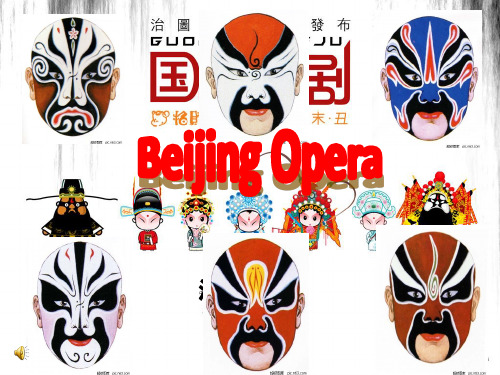
combine
Mix two or more things
Do you know it ?
• Beijing opera of China dates back to the 18th century, it is a national treasure with a history of 200 years. • It combines acting, talking, singing, music, dancing and acrobatics.
Do you know it ?
• Beijing opera of China dates back to the 18th century, it is a national treasure with a history of 200 years. • It combines acting, talking, singing, music, dancing and acrobatics. • The costumes and masks are always in bright colour, the main instrument played in Beijing Opera — Jinghu. • There are four main roles in Beijing Opera: sheng dan jing chou
淮南四中 吴一昊
Who is the main role?
Do you know it ?
• Beijing opera of China dates back to the 18th century, it is a national treasure with a history of 200 years.
新起点小学英语二年级上册单词表
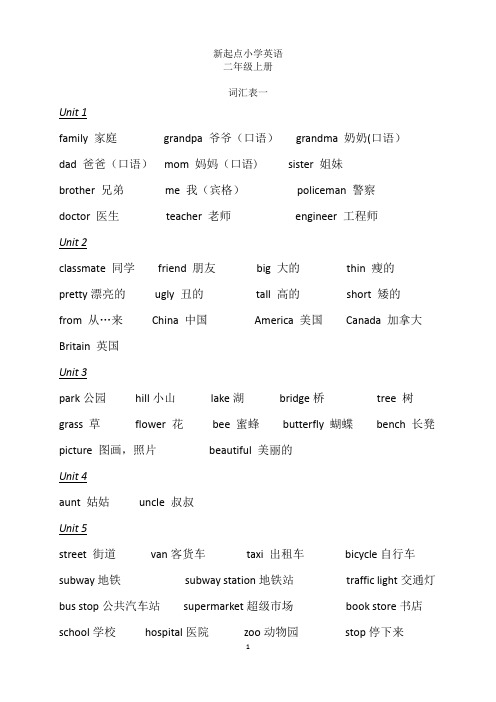
新起点小学英语二年级上册词汇表一Unit 1family 家庭grandpa 爷爷(口语)grandma 奶奶(口语)dad 爸爸(口语)mom 妈妈(口语) sister 姐妹brother 兄弟me 我(宾格)policeman 警察doctor 医生teacher 老师engineer 工程师Unit 2classmate 同学friend 朋友big 大的thin 瘦的pretty漂亮的ugly 丑的tall 高的short 矮的from 从…来China 中国America 美国Canada 加拿大Britain 英国Unit 3park公园hill小山lake湖bridge桥tree 树grass 草flower 花bee 蜜蜂butterfly 蝴蝶bench 长凳picture 图画,照片beautiful 美丽的Unit 4aunt 姑姑uncIe 叔叔Unit 5street 街道van客货车taxi 出租车bicycle自行车subway地铁subway station地铁站traffic light交通灯bus stop公共汽车站supermarket超级市场book store书店school学校hospital医院zoo动物园stop停下来wait等候go走Unit 6Beijing北京Tiananmen Square天安门广场the Great Wall长城the Summer Palace颐和园the Forbidden City紫禁城Temple of Heaven天坛Beihai Park北海公园Beijing Zoo北京动物园Beijing Duck北京烤鸭Beijing Opera 京剧Temple Fair 庙会great 伟大的Unit 7Festival节日Merry愉快的Christmas圣诞节Christmas tree圣诞树Santa Claus圣诞老人bell铃present礼物card明信片stocking长袜happy快乐的Spring Festival春节dragon dance舞龙paper-cut剪纸lantern灯笼Hong Kong香港Toronto多伦多Sydney悉尼rat鼠ox牛dragon龙snake 蛇horse马sheep羊rooster鸡pig猪New Year新年Unit 8Sofa沙发词汇表二A America 美国10Aunt姑姑22 B Beautiful美丽的15Bee蜜蜂14 Beihai Park北海公园32Beijing北京31*Beijing Duck北京烤鸭34*Beijing Opera京剧34Beijing Zoo北京动物园32Bell铃37*Bench长凳15Bicycle自信车25 Big大的7book store书店26bridge桥13*Britain英国10Brother兄弟1 bus stop公共汽车站25butterfly蝴蝶14 C Canada加拿大10Card明信片37 China中国10Christmas圣诞节37Christmas tree圣诞树37classmate同学8 D dad 爸爸口语(1)冰doctor 医生(4)冰dragon 龙(39)dragon dance舞龙(38)E englneer 工程师(4) F family家庭1festival节日37flower花13friend朋友7*from 从…来10G *go走28*grandma奶奶口语1Grandpa爷爷口语1 Grass草*Great伟大的大的36H happy 快乐的38 hill 小山13*Hong Kong 香港39*horse 马39hospital 医院26L Lake 湖13Lantern灯笼38 Me我宾格1Mom妈妈口语1Merry愉快的37N *New Year 新年(40) O*ox牛39P paper—cut剪纸38park公园13*picture图画照片15*pig猪39*pollCeman警察4present礼物37pretty漂亮的7R *Rat鼠39*rooster 鸡39S Santa Claus 圣诞老人37school 学校26*sheep 羊39short 矮的7sister 姐妹1*snake 蛇39*sofa 沙发44Spring Festival春节38stocking 长袜37*stop 停下来28street 街道25subway 地铁25subway station地铁站25supermarket超级市场26*Sydney 悉尼39 T tall 高的7taxi 出租车25*teacher 老师4*Temple Fair庙会34 Temple of Heaven天坛32the Forbidden City紫禁城32the Great Wall长城31the Summer Palace颐和园31thin瘦的7Tiananmen Square天安门广场(31)*Toronto 多伦多(39)traffic light 交通灯(25) tree 树(13) U Ugly丑的7*Uncle叔叔22V Van客户车25W *Wait等待28Z Zoo动物园26。
beijing opera—优秀英文短文阅读(适合大学四六级水平)
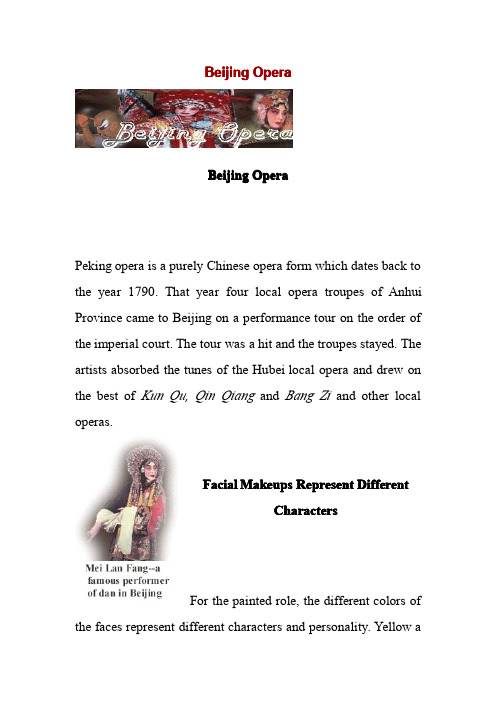
Beijing OperaBeijing OperaPeking opera is a purely Chinese opera form which dates back to the year1790.That year four local opera troupes of Anhui Province came to Beijing on a performance tour on the order of the imperial court.The tour was a hit and the troupes stayed.The artists absorbed the tunes of the Hubei local opera and drew on the best of Kun Qu,Qin Qiang and Bang Zi and other local operas.Facial Makeups Represent DifferentCharactersFor the painted role,the different colors of the faces represent different characters and personality.Yellow and white represent cunning,red stands for uprightness and loyalty,black means valor and wisdom,blue and green indicate the vigorous and enterprising character of rebellious heroes and gold and silver represent mystic or super-natural power.Unique Terminology"Sheng,dan,jing,chou,"for instance,are just the terms for four different types of roles."sheng"is the positive male role,"dan" is the positive female role,"jing"is a supporting male role with striking character and"chou"is the clown.Every type has its telltale facial makeup and decoration.But actually,"piao you"means Peking opera fans,"piao fang" means the place where fans meet to amuse themselves and"xia hai"means turning professional.When you come across with a small group of Peking opera fans singing in a street corner,that corner can be considered a"street piao fang."There is no lacking of social celebrities among Peking opera fans.EmperorGuang Xu of Qing Dynasty,for example,was not only a good amateur Peking opera singer,but was also a good drummer in the Peking opera orchestra(thedrummer plays the role of the director of the orchestra).The Empress Dowager was an avid Peking opera fan,too.The huge three-storey theater in the Summer Palace is a proof of her love for Peking opera.。
- 1、下载文档前请自行甄别文档内容的完整性,平台不提供额外的编辑、内容补充、找答案等附加服务。
- 2、"仅部分预览"的文档,不可在线预览部分如存在完整性等问题,可反馈申请退款(可完整预览的文档不适用该条件!)。
- 3、如文档侵犯您的权益,请联系客服反馈,我们会尽快为您处理(人工客服工作时间:9:00-18:30)。
The role of
Jing
主要扮演性格、品质或相貌不同于一般、有突出特征的男性人物,俗称花脸
张飞
关羽
包拯
正净
Jing are the painted-faced roles, and they represent warriors, heroes, statements and bad men. The painted faces are symbolic and exaggerated, and are used to represent a character’s personality.
《贵妃醉酒》剧照
《霸王别姬》剧照
《五花洞》
剧情:宋代,五大郎与潘金莲夫妻俩因年 月不好,离家去寻兄弟武松。蜈蚣、蝎子、 壁虎、蛤蟆、毒蛇等在五花洞修炼成精, 因恨仙道张天师与它们作对,前往京都作 乱。路遇武大郎携妻潘金莲寻访其弟武松, 见二人一矮丑、一娇媚,相映成趣,遂幻 化成二人模样相戏。真假武大郎、潘金莲 相貌言语一般无二,难辨真伪,乃互相扭 至阳谷县衙申告。知县吴大炮难以判识, 五毒精又变出一假知县与之哄闹。恰逢包 拯(另有版本为张天师)巡视至此,以照 妖镜辨出真伪,又请来天兵天将降服了众 妖。
What does each mark of painted faces represent?
This painted face is used to represent a clown, or a kind-hearted and humorous man, but sometimes, it is negative, bad or silly. This painted face is used to represent a loyal and courageous character.
《穆桂英挂帅》
剧本描写北宋时,西夏犯境。辞 朝隐居的佘太君闻讯,遣曾孙杨 文广、曾孙女杨金花去汴京探听。 杨文广在校场比武,刀劈兵部尚书 王强之子王伦,夺得帅印归来。穆 桂英深感朝廷刻薄寡恩,不愿再 为它效力。佘太君劝她以抵御西 夏侵扰为重,穆桂英乃挂帅出征。 集中塑造了穆桂英的英雄形象。
《打渔杀家》
Unit 6
Chinese Heritage
授课人:高洁
Step 1—Lead-in
How many Chinese heritage do you know?
Treasure(财宝)
Beijng Opera
1. Do you like to watch Beijing Opera?
Are you interested in Beijing Opera?
武净
副净
The role of
Chou are basically the clowns marked by a small square-shaped white color on their noses. They are sometimes positive, kindhearted and humorous, but at other times negative, bad or silly.
2. Do you know anything about the history of Beijing Opera?
Step 2
Beijng Opera
Many songs like: 李玉刚——《新贵妃醉酒》 《梦青衣》 黄阅 ——《折子戏》 后弦 ——《西厢》 余少群 ——《戏梦人生》
程砚秋
尚小云
Master Mei Lanfang
梅兰芳(1894年-1961年),1894年生于北京,他出生于京 剧世家。10岁登台在北京广和楼演出《天仙配》,工花旦。 1908年搭喜连成班。1911年北京各界举行京剧赏评选活动, 张贴菊榜,梅兰芳名列第三名探花。
代表作品:《五花洞》《贵妃醉酒》《嫦娥奔月》《霸王 别姬》《黛玉葬花》等
The Background of Beijing Opera
京剧是我国的国粹,是流行于全国的重要剧种 之一。清乾隆五十五年(1790年)江南久享盛 名的徽班"三庆班"入京为清高宗(乾隆帝)的八 旬"万寿"祝寿。徽班是指演徽调或徽戏的戏班, 清代初年在南方深受欢迎。继此,许多徽班接踵 而来,其中最著名的有三庆、四喜、春台、和春, 习称"四大徽班"。他们在演出上各具特色,三庆 擅演整本大戏;四喜长于昆腔剧目;春台多青少 年为主的童伶;和春武戏出众。
《沙家浜》
抗战时期,江南新四军浴血抗 日,某部指导员郭建光带领十 八名新四军伤病员在沙家浜养 伤,“忠义救国军”胡传魁、 刁德一假意抗战暗投日寇,地 下共产党员阿庆嫂依靠以沙奶 奶为代表的进步抗日群众,巧 妙掩护了新四军安全伤愈归队, 最终消灭了盘踞在沙家浜的敌 顽武装,解放了江南大好河山。
The Roles of Peking Opera
白色--代表阴险,疑诈,飞扬,肃煞的人物 形象.如:曹操,司马懿 . 绿色--代表顽强,暴躁的人物形象.如:武天 虬. 黄色--代表枭勇,凶猛的人物,如:宇文成 都. 紫色--表现刚正,稳练,沉着的人物,如荆 柯. 金,银色--表现各种神怪形象,如孙悟空等
The Patterns of Facial Make-up
The color of facial make-up
京剧脸谱色彩十分讲究,看来五颜六色的脸谱品 来却巨细有因,决非仅仅为了好看。不同含义的 色彩绘制在不同图案轮廓里,人物就被性格化了。 红色--表现忠贞,英勇的人物性格,如:关羽. 蓝色--表现刚强,骁勇,有心计的人物性格,如: 窦尔敦. 黑色--表现正直,无私,刚直不阿的人物形象, 如:包公.
脸谱图案非常丰富,大体上分为额 头图,眉型图,眼眶图,鼻窝图, 嘴叉图,嘴下图。每个部位的图案 变化多端,有规律而无定论,如: 包拯黑额头有一白月牙,表示清正 廉洁。 孟良额头有一红葫芦,示意此人爱 好喝酒。
Байду номын сангаас
1828年以后,一批汉戏演员陆续进入北 京。汉 戏又名楚调,现名汉剧,以西皮、二黄两种声腔 为主,尤侧重西皮,是流行于湖北的地方戏。由 于徽、汉两个剧种在声腔、表演方面都有血缘关 系,所以汉戏演员在进京后,大都参加徽班合作 演出,且一些成为徽班的主要演员,如余三胜即 是。徽调多为二黄调、高拨子、吹腔、四平调等, 间或亦有西皮调、昆腔和弋腔;而汉调演员演的 则是西皮调和二黄调。徽、汉两班合作,两调合 流,经过一个时期的互相融会吸收,再加上京音 化,又从昆曲、弋腔、秦腔不断汲取营养,终于 形成了一个新的剧种--京剧。第一代京剧演员的 成熟和被承认,大约是在1840年左右。
This painted face is used to represent a young man who portrays a scholar, an official, or warrior, etc. This painted face is used to represent a bad man or a traitor.
Sheng (male) 生 Dan (female) 旦 Jing (painted face)净
Chou (clown)丑
The role of Sheng
Sheng are the leading actors who portray schoolars, officials, warriors, etc. Sheng can be divided into three categories: the old, the young and the kungfu experts.
Some famous Beijing Opera
《群英会》 《打渔杀家》 《空城计》 《贵妃醉酒》 《三岔口》 《霸王别姬》 《四郎探母》 《玉堂春》 《长坂坡》
《将相和》 《穆桂英挂帅》 《杨门女将》 《海瑞罢官》 《曹操与杨修》 《沙家浜》 《红灯记》 《智取威虎山》 《骆驼祥子》
图:梅兰芳饰萧桂英、周信芳饰萧恩
《群英会》
剧情: 取材于《三国演义》,曹操率军南下攻吴,周瑜 故友蒋干过江访瑜,诱蒋盗去假造之曹营水军都督蔡瑁、 张允之反书。蒋干自以为聪明,曹操果中计,怒斩蔡、 张二人。
《空城计》
三国时期,魏国派司马懿挂帅 进攻蜀国街亭,诸葛亮派马谡 驻守失败。司马懿率兵乘胜直 逼西城,诸葛亮无兵迎敌,但 沉着镇定,大开城门,自己在 城楼上弹琴唱曲。司马懿怀疑 设有埋伏,引兵退去。等得知 西城是空城回去再战,赵云赶 回解围,最终大胜司马懿。
Beijng Opera Beijing Opera is a historical art form, traditional music and singing are used to tell a story on stage. The rhythm plays a part in telling the story. It can get faster and louder, or make sudden stops to go with the action.
花旦
青衣
刀马旦
老旦
花旦与青衣的区别: 北方剧种多称青衣,南方剧种多称正旦。青衣在旦行里占着最主要的位置,所以叫正旦, 扮演的一般都是端庄、严肃、正派的人物,大多数是贤妻良母,或者是贞节烈女之类的人 物。如秦香莲、王宝钏等。 花旦:多表演性格活泼的女子,也有一部分悲剧和反面人物。如:红娘
梅兰芳
荀慧生
老生
小生
武生
The role of Dan
Dan , or female actors, include the young, the middle-aged, and old women. Traditionally, female roles were played by male actors.
